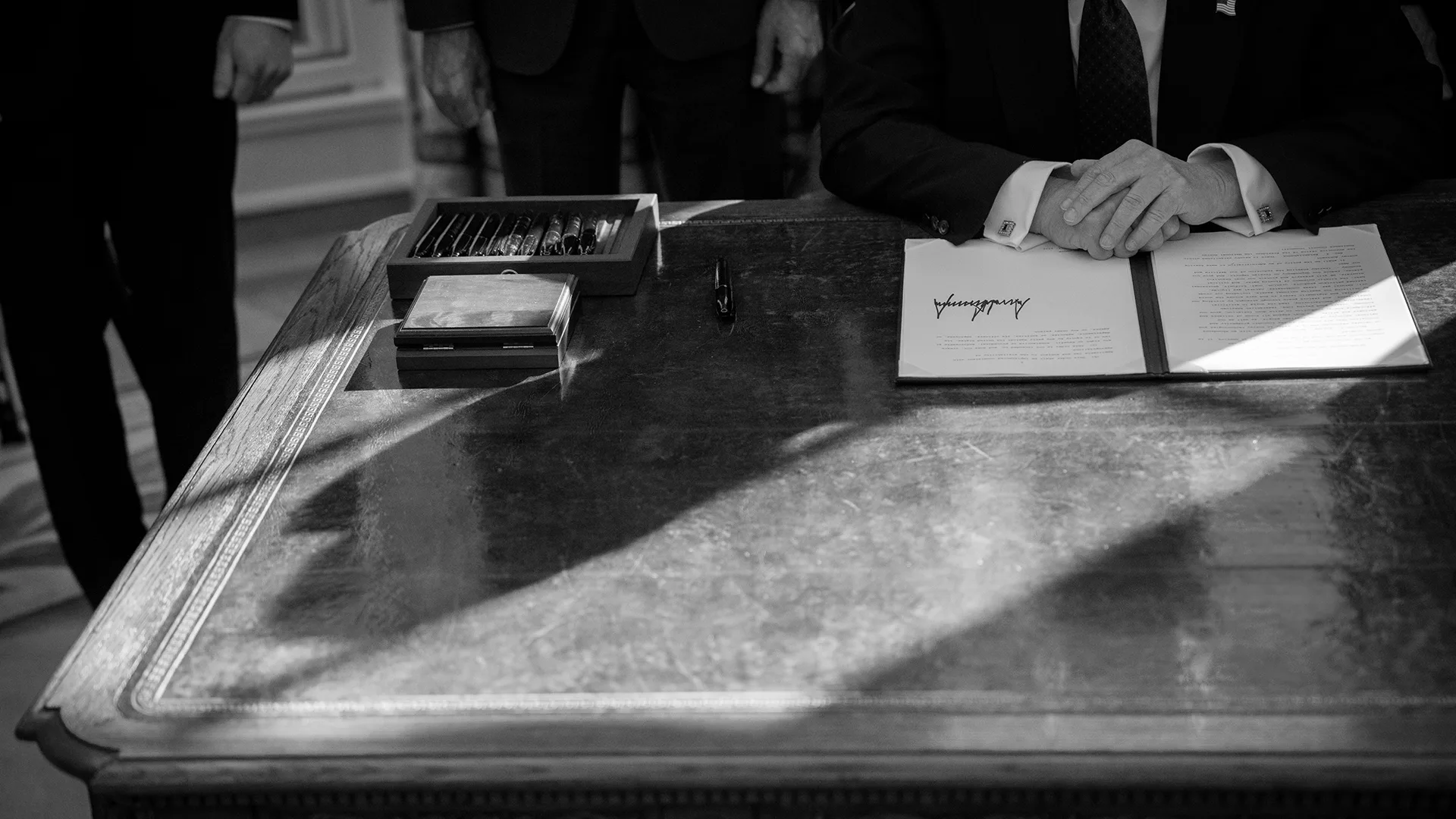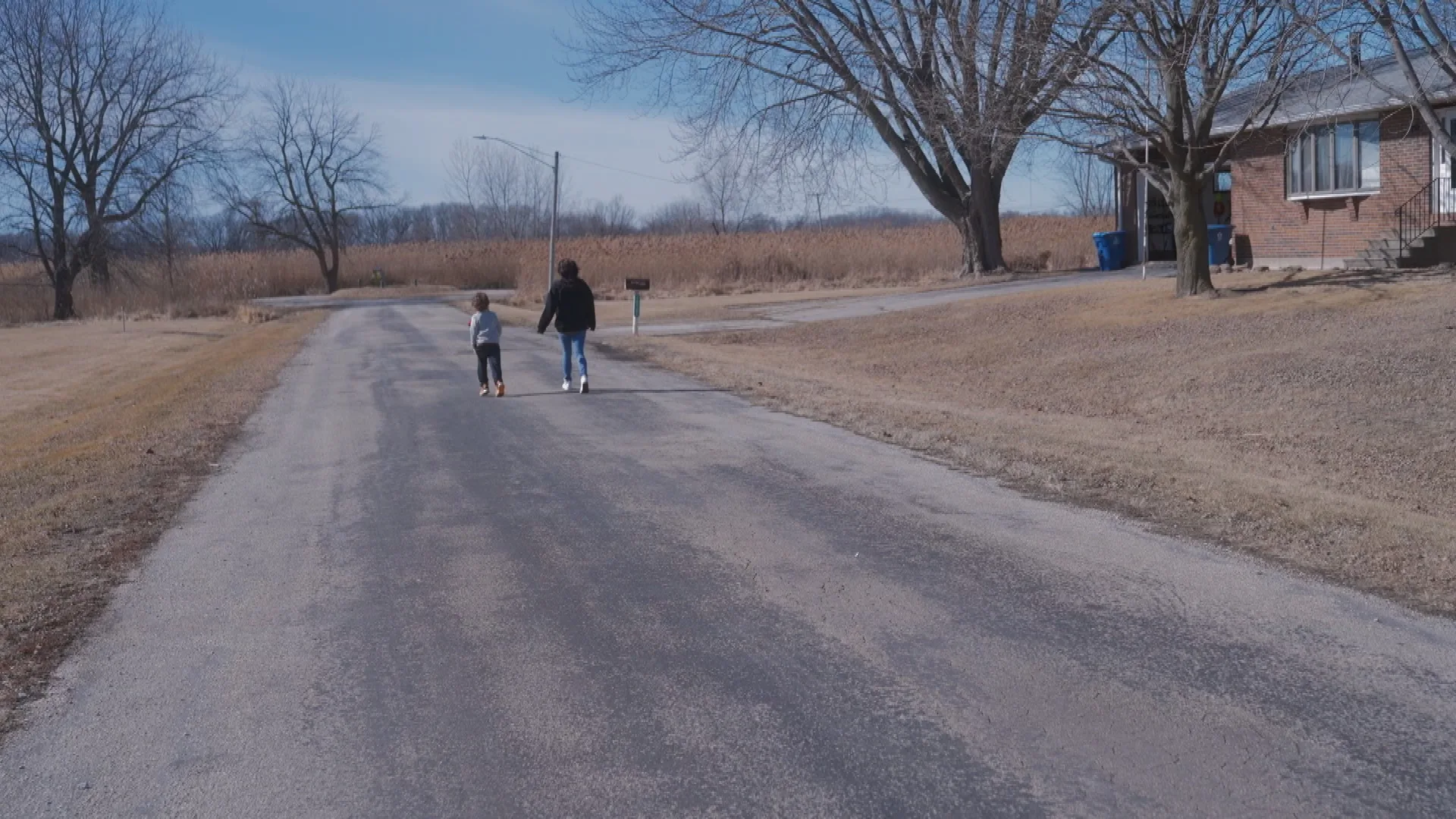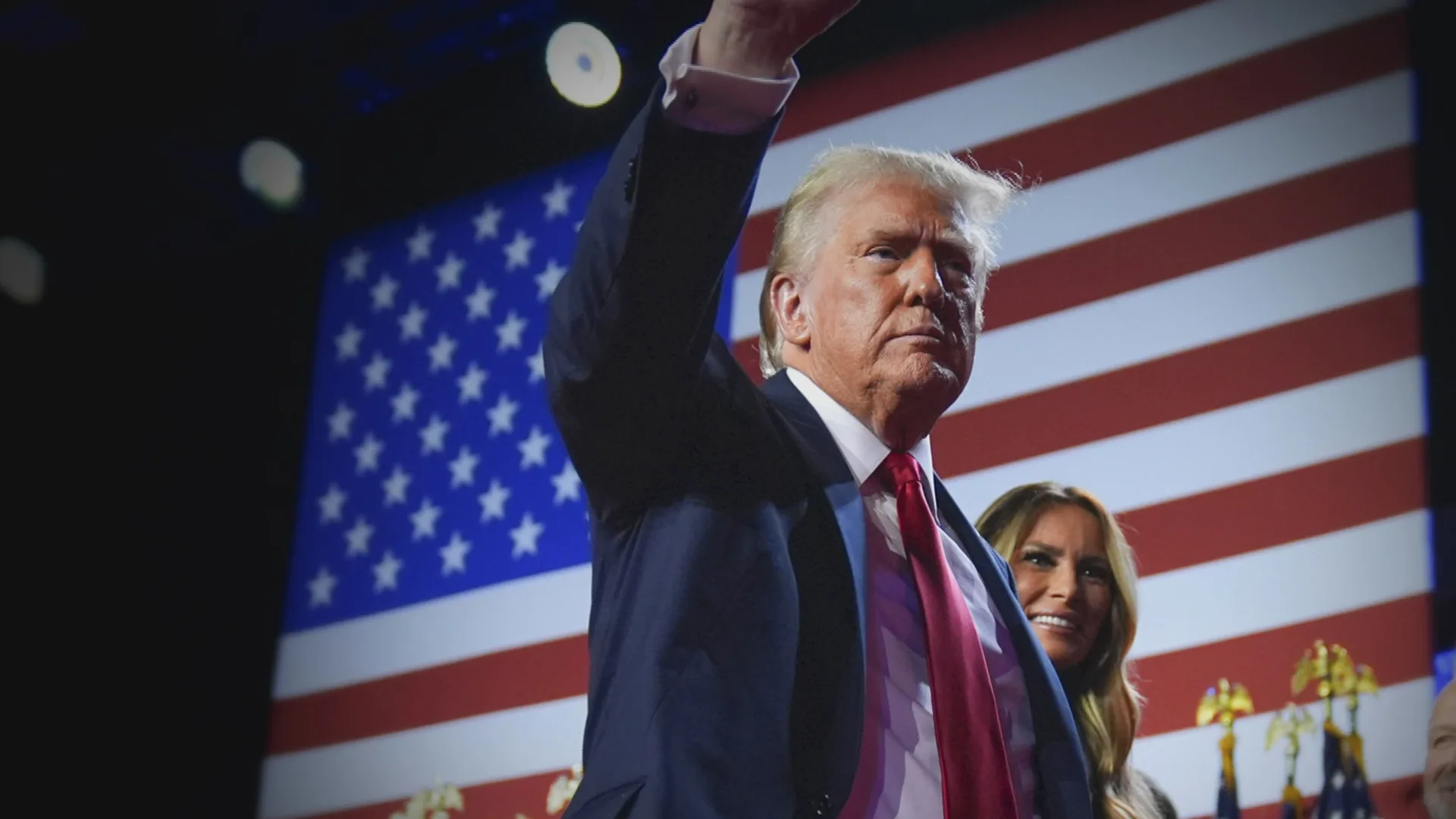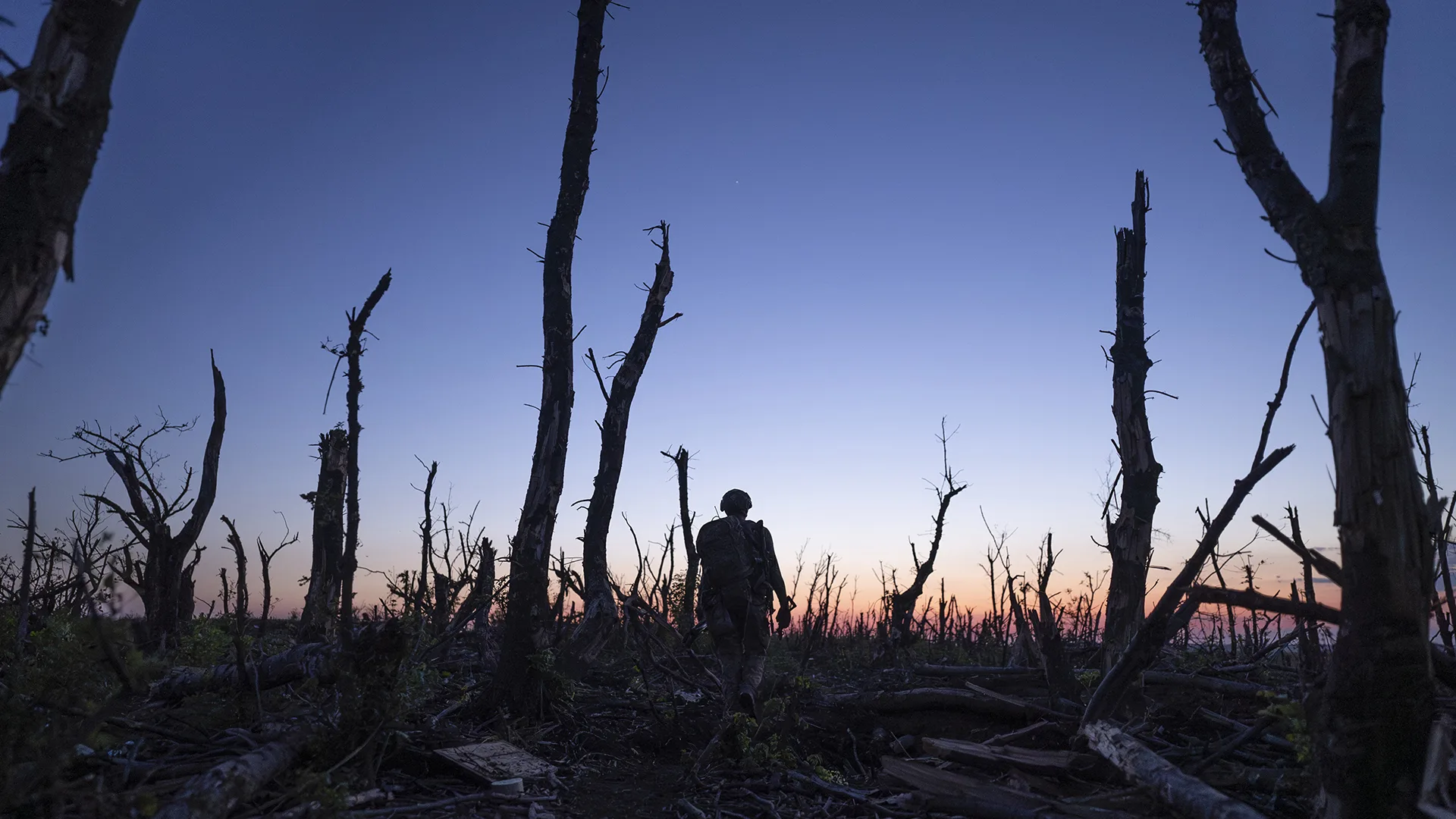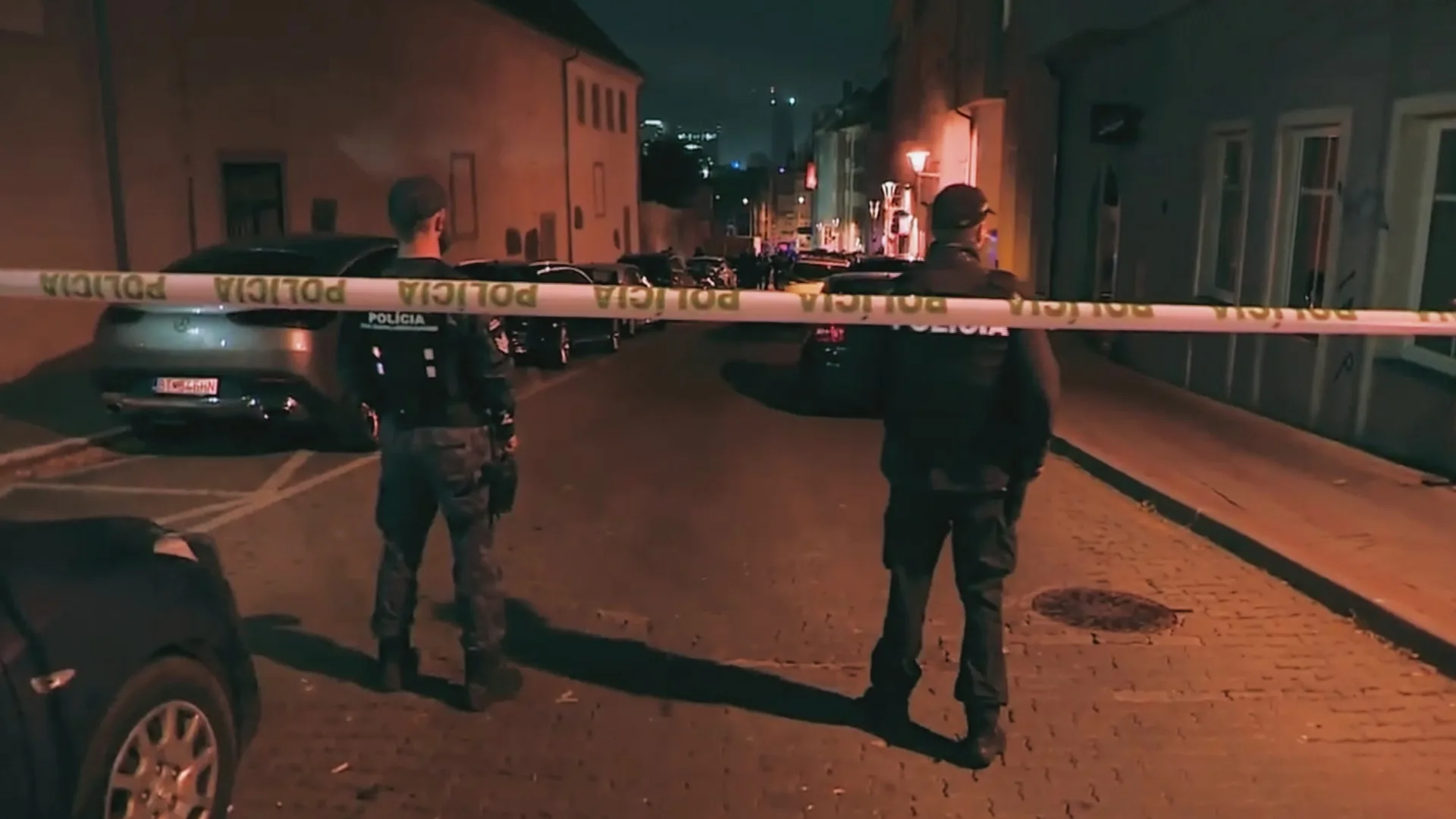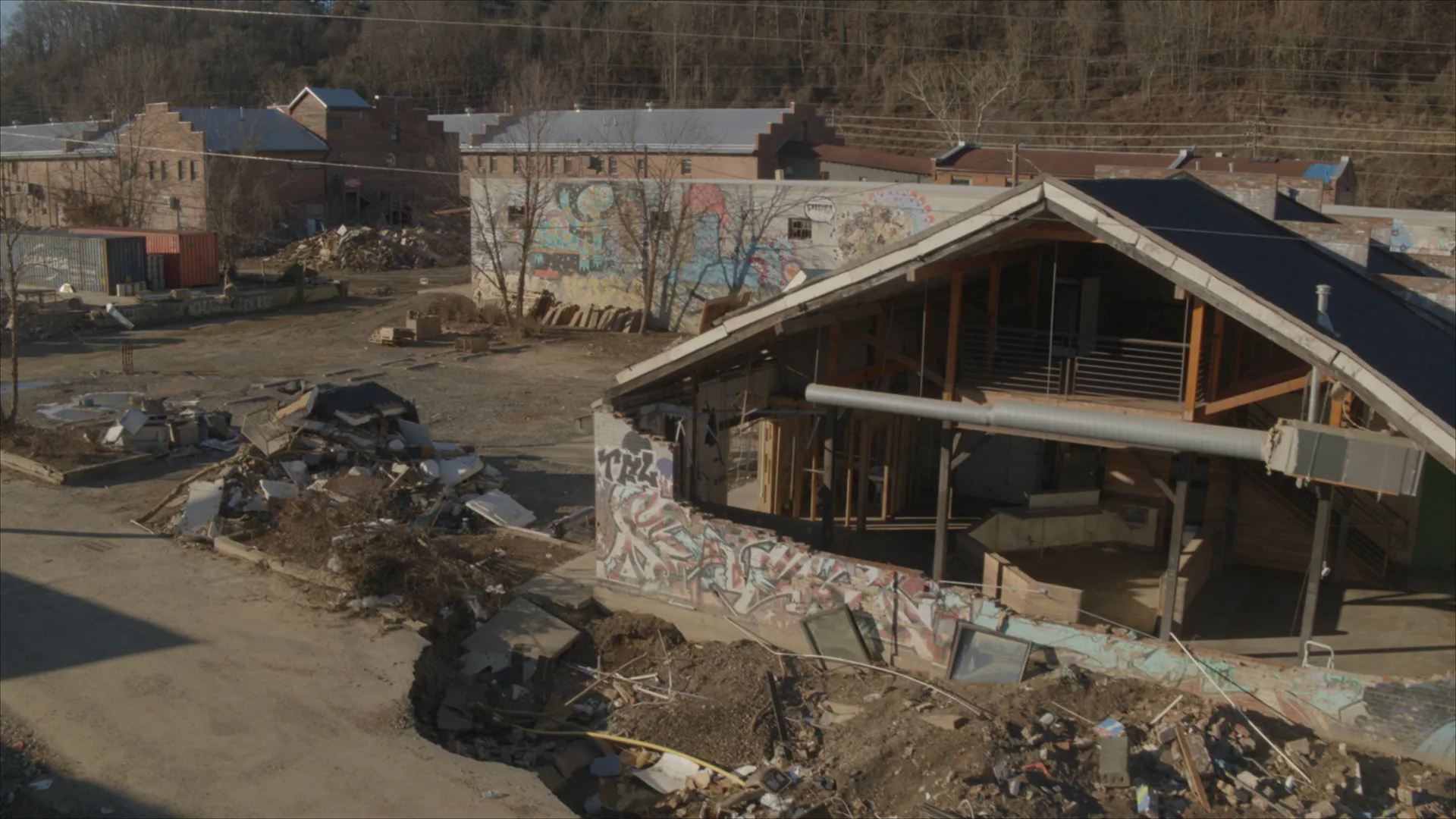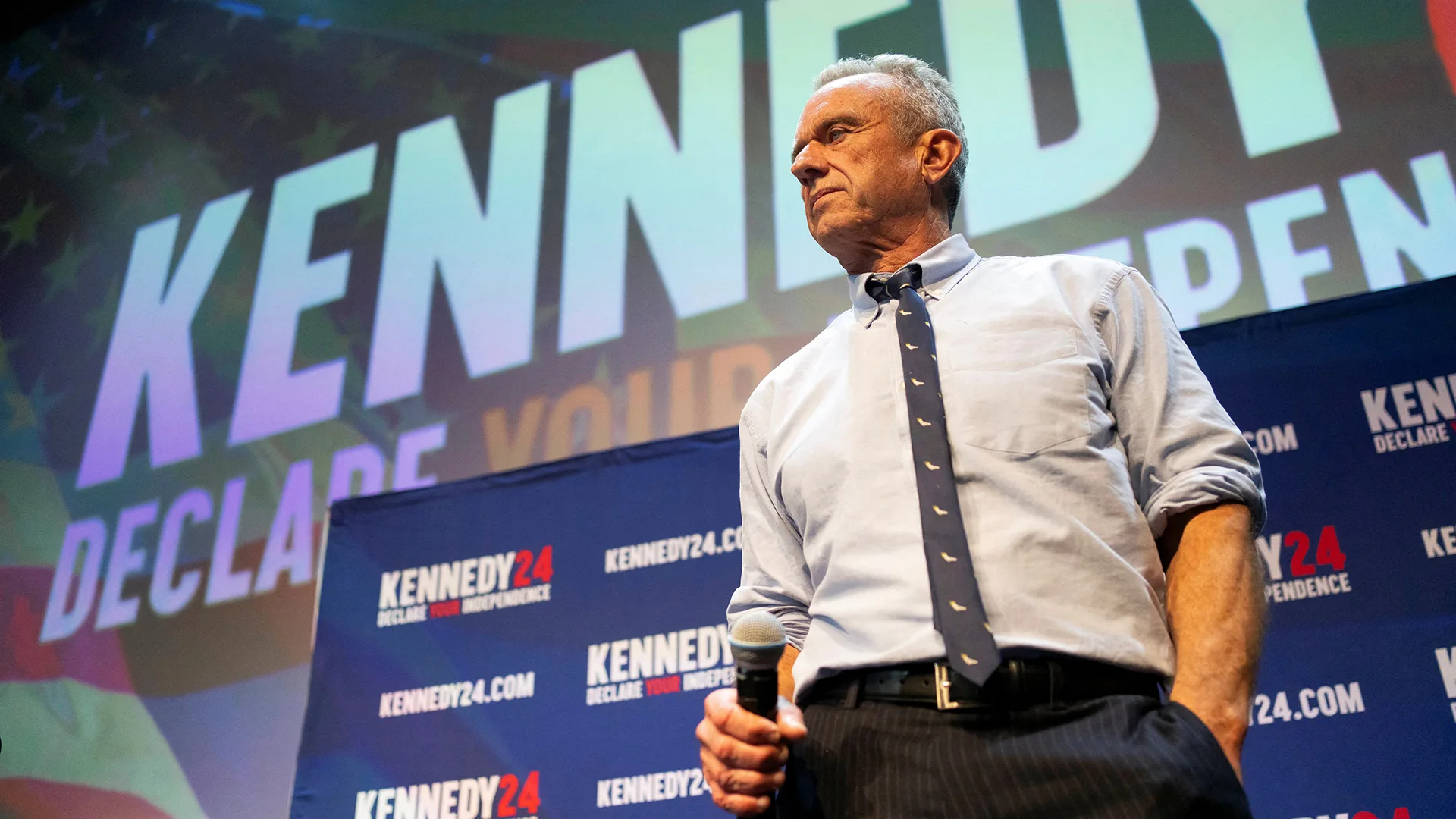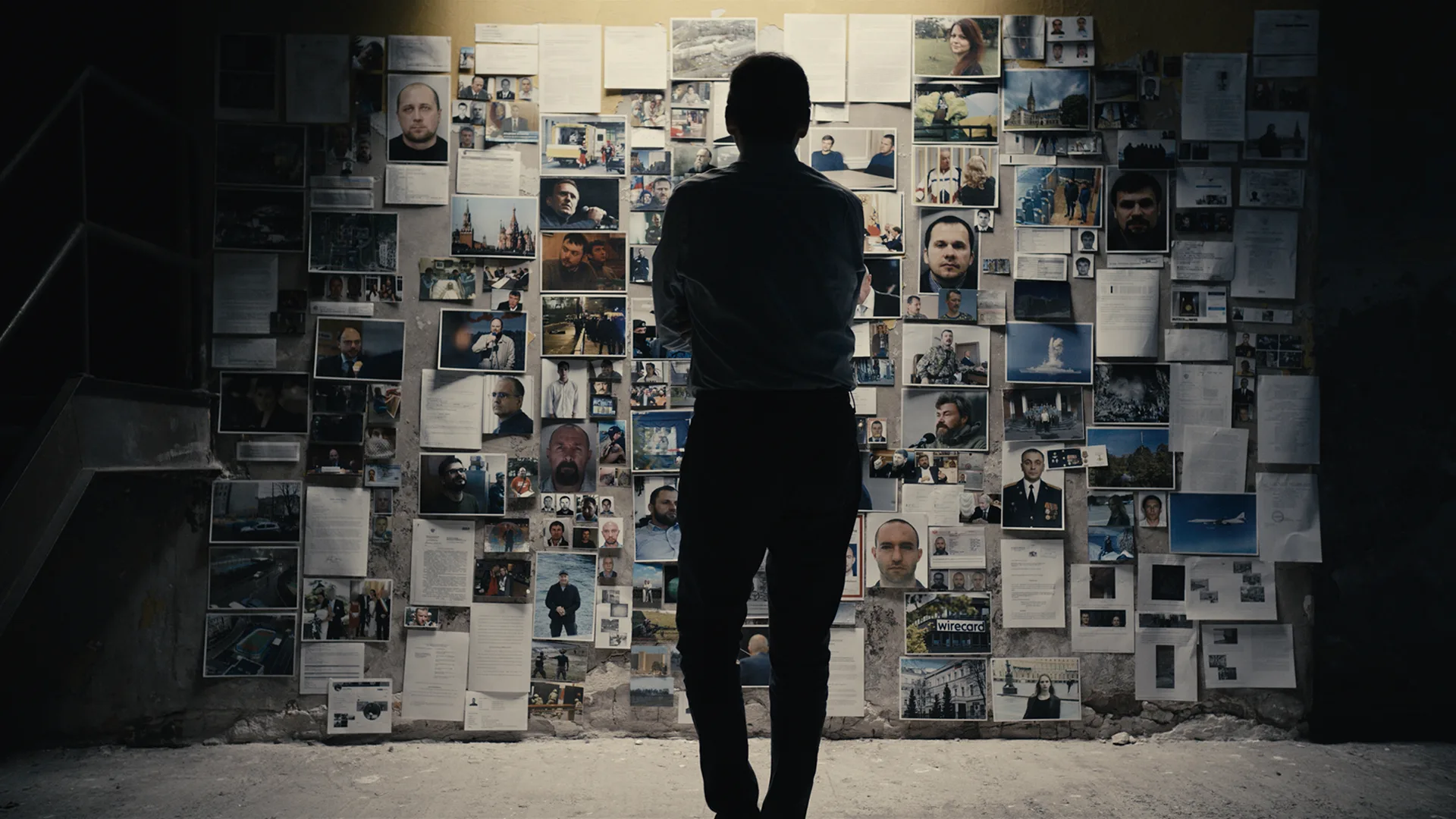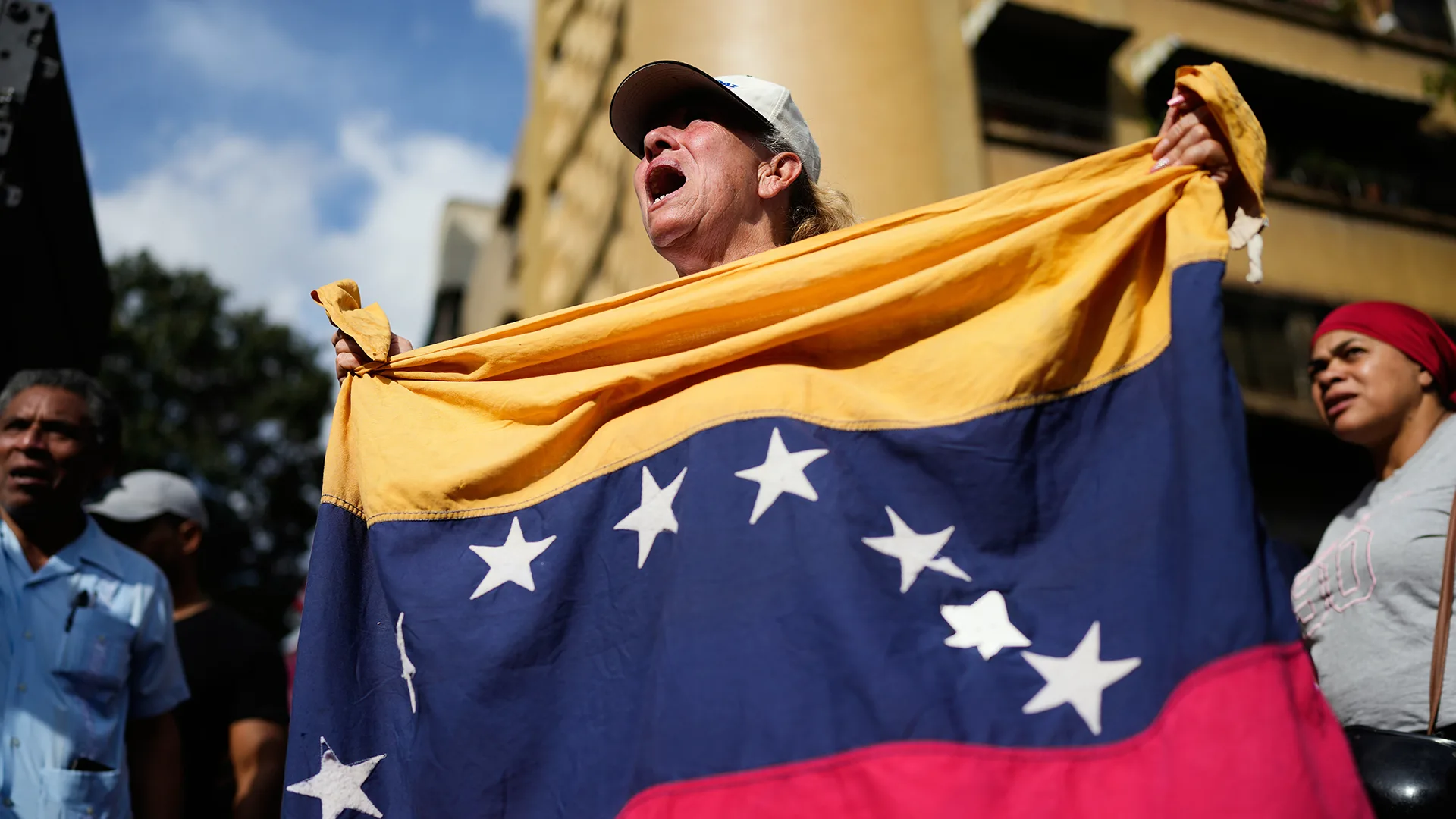The Rise of Germany’s New Right
November 4, 2025
1h 44m
An investigation into how far-right leaders in Germany have risen to the brink of power
The Rise of Germany’s New Right
November 4, 2025
1h 44m
Share
An investigation into how far-right leaders in Germany have risen to the brink of power. Filmmaker Evan Williams (Germany’s Enemy Within, Germany’s Neo-Nazis & the Far Right, Escaping Eritrea, Myanmar’s Killing Fields) examines the reasons behind the surge in support for the German far right’s brand of hardline nationalist politics, and the roles of Russia and the U.S.
Directed by
Produced by
Correspondent
Transcript
Credits
Journalistic Standards
Support provided by:
Learn More
Most Watched
The FRONTLINE Newsletter
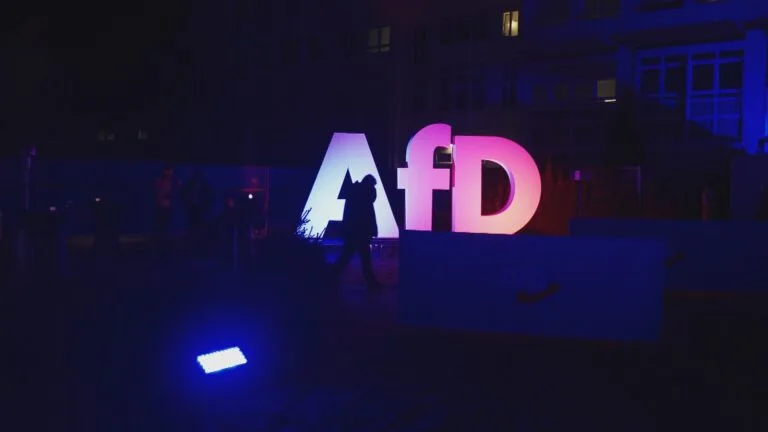
Inside Germany’s Far-Right Surge
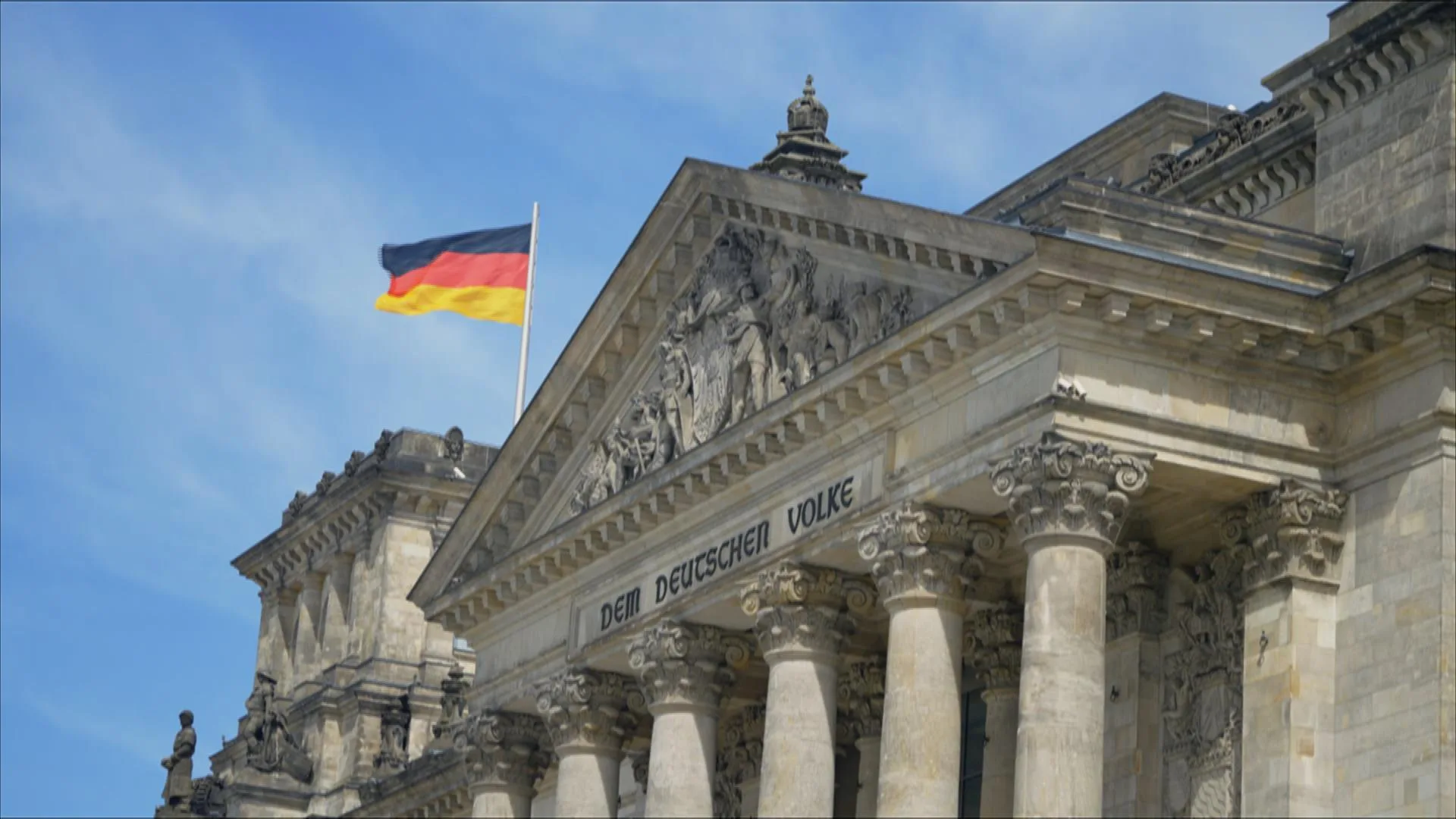
Germany’s Enemy Within
Related Stories

Germany’s Laws on Hate Speech, Nazi Propaganda & Holocaust Denial: An Explainer
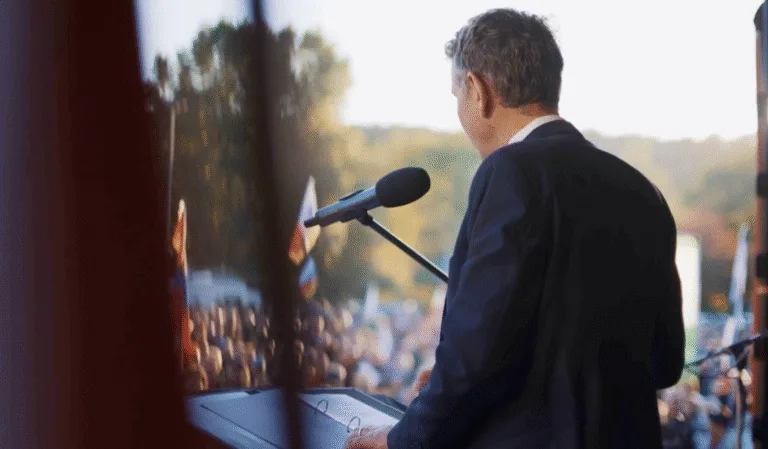
Why an Influential Figure in Germany’s Far-Right AfD Party Is Accused of ‘Whitewashing’ Nazi Crimes
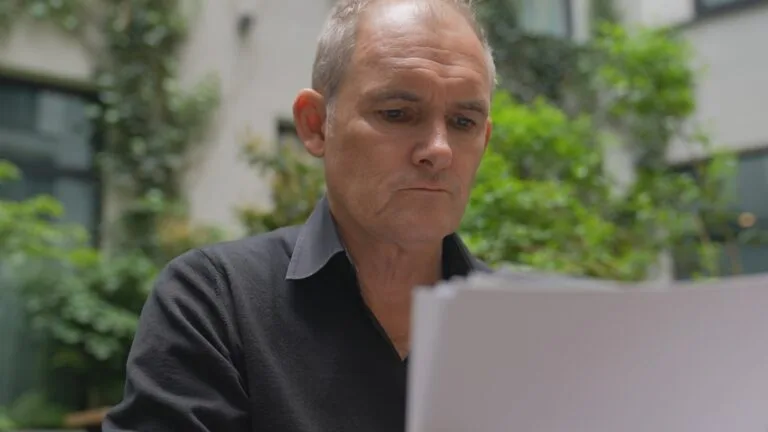
‘A Big Wake-Up Call’: Filmmaker Evan Williams on Germany’s Neo-Nazis and the Far Right
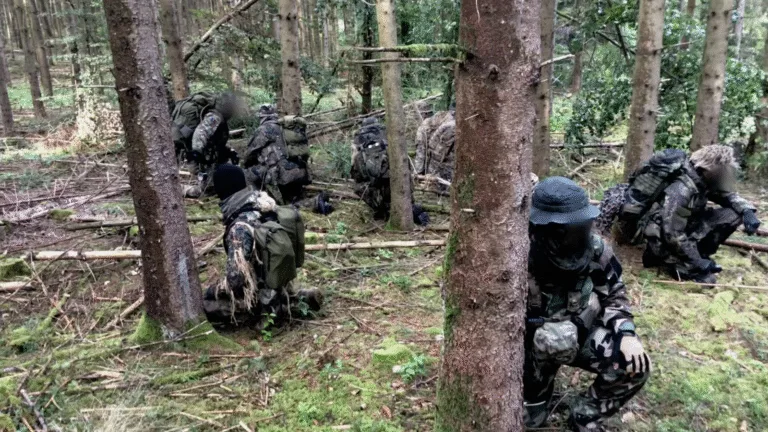
‘Ready to Fight a War’: A German Far-Right Group Stockpiled Weapons & Prepped for Violence. Its Alleged Leader Wasn’t Tried on Terror Charges.
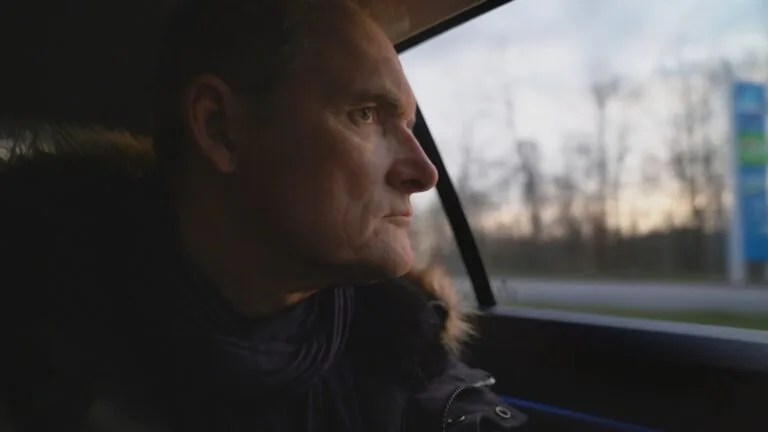
“Germany’s Enemy Within” Filmmaker on the Surge of the Far Right and Political Divides in a Country Grappling With its Nazi Past
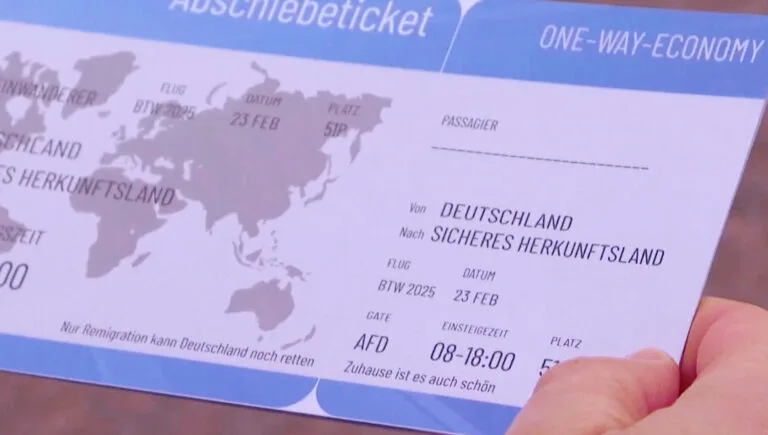
A German Far-Right Party’s Campaign Tactic: Fake ‘Deportation Tickets’

Germany’s Neo-Nazis & the Far Right

Germany’s Enemy Within
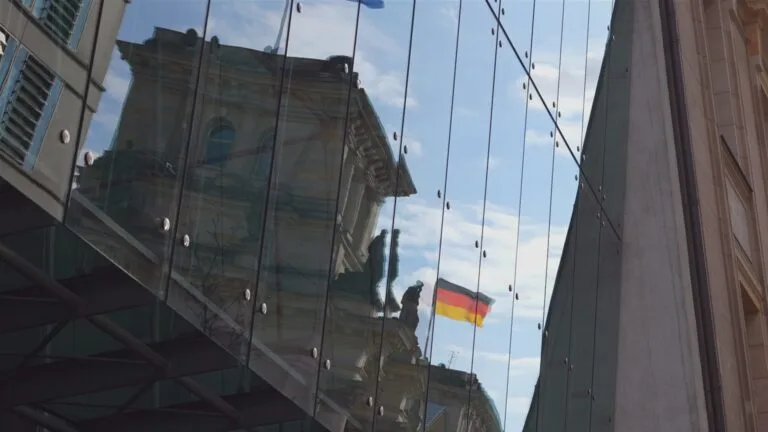
Investigating the Rise of the Far Right in Germany

Inside Germany’s Far-Right Surge
Related Stories

Germany’s Laws on Hate Speech, Nazi Propaganda & Holocaust Denial: An Explainer

Why an Influential Figure in Germany’s Far-Right AfD Party Is Accused of ‘Whitewashing’ Nazi Crimes

‘A Big Wake-Up Call’: Filmmaker Evan Williams on Germany’s Neo-Nazis and the Far Right

‘Ready to Fight a War’: A German Far-Right Group Stockpiled Weapons & Prepped for Violence. Its Alleged Leader Wasn’t Tried on Terror Charges.

“Germany’s Enemy Within” Filmmaker on the Surge of the Far Right and Political Divides in a Country Grappling With its Nazi Past

A German Far-Right Party’s Campaign Tactic: Fake ‘Deportation Tickets’

Germany’s Neo-Nazis & the Far Right

Germany’s Enemy Within

Investigating the Rise of the Far Right in Germany

Inside Germany’s Far-Right Surge
MALE NEWSREADER:
Support for the Alternative for Germany is higher than ever before.
NARRATOR:
Correspondent Evan Williams investigates the surging popularity of Germany’s new right.
MAXIMILIAN KRAH, AfD politician:
Now we are the party of the future.
NARRATOR:
The effort to attract a new generation—
ROLAND VERWIEBE, Potsdam University:
The AfD is dominating the political discussion on TikTok.
NARRATOR:
—and the international connections.
KAI ARZHEIMER, Political extremism scholar:
Russia supports far-right actors all over Europe, and the United States government does much the same out in the open.
NARRATOR:
Now on FRONTLINE, The Rise of Germany’s New Right.
program
January 25, 2025
ALICE WEIDEL, AfD politician:
Yes. Now, can you hear me?
Halle, Germany
ELON MUSK [on video]:
Hello? Can you hear me out there?
ALICE WEIDEL:
Yes, we can hear you!
ELON MUSK [on video]:
Unfortunately, I can’t hear you very well … so hopefully—wow, hello, everyone. I hope you can hear me well.
EVAN WILLIAMS, Correspondent:
It was less than a month before the German federal election.
ELON MUSK [on video]:
Well, first of all, I wanted to really say that I’m very excited for the AfD … and I think you are really the best hope for Germany.
EVAN WILLIAMS:
Elon Musk was addressing a rally for the hardline nationalist party AfD, Alternative für Deutschland.
ELON MUSK [on video]:
It’s good to be proud of German culture and German values and not to lose that in some sort of multiculturalism that dilutes everything … The German people are really an ancient nation. It goes back thousands of years.
KAI ARZHEIMER, Political extremism scholar:
This is absolutely unprecedented. A foreign billionaire using this platform that he owns to support a radical if not extremist party during the election campaign was a first for Germany, and probably a first for many European countries. It was like an act of recognition.
MAXIMILIAN KRAH, AfD politician:
We have the richest and most innovative entrepreneur of the world on our side. We have Elon Musk. So of course that makes us extremely sexy. And perception is reality. Now we are the party of the future. We are now the party of international connections, and we are the party of modern technology, of innovative thinking. It shows that we are a serious political force.
ELON MUSK [on video]:
The fate of the world, I think, rests upon this election in Germany. It’s extremely fundamental. Go, go, go! Fight, fight, fight!
ALICE WEIDEL:
Fight, fight, fight!
ELON MUSK [on video]:
All right.
CORRESPONDENT
Evan Williams
FEMALE NEWSREADER:
According to some observers, the shift towards the right in Europe is unlikely to slow down.
FEMALE NEWSREADER:
We’ve seen parties touting far-right ideologies gain seats in Italy, France, the Netherlands and Finland. That’s just to name a few.
PRODUCED BY
Evan Williams
Hannah Congdon
CROWD [chanting in German]:
Our streets, our country. The youth are resisting. We are the people.
EVAN WILLIAMS:
For the past 18 months, as support for nationalist, anti-immigrant parties has surged across Europe, I’ve been reporting on the rise of the AfD in Germany.
DIRECTED BY
Evan Williams
BJÖRN HÖCKE, AfD leader, Thuringia:
[Speaking German] AfD, no to the mosque.
EVAN WILLIAMS:
Sitting down with senior officials.
Do you believe that people who have not assimilated enough should be deported?
EVAN WILLIAMS:
Investigating links to Putin’s Russia.
MARTIN LAINE, Delfi Meedia:
It’s like a detailed accounting, how the Russians have conducted disinformation warfare.
EVAN WILLIAMS:
And the Trump administration’s expressions of support for Europe’s far right.
VICE PRESIDENT JD VANCE:
No voter on this continent went to the ballot box to open the floodgates to millions of unvetted immigrants.
ARMIDA VAN RIJ, Centre for European Reform:
They share this perceived existential threat caused by migration. Far-right views have become more mainstream. There’s increasing collaboration and just discussion of working with the far right. They’re no longer excluded, but actually they’re part of the political process now.
The Rise of Germany’s New Right
Thuringia, Eastern Germany
September 1, 2024
MALE NEWSREADER:
To Germany now, where the success of the far right in two state elections is tonight sending shockwaves across the country.
MALE NEWSREADER:
A far-right party winning a state election in Germany for the first time since the Nazis.
EVAN WILLIAMS:
In the fall of 2024, I was in Germany as the AfD swept to an election victory in the eastern state of Thuringia.
MALE NEWSREADER:
The head of the AfD in Thuringia, a party branded extremist by German intelligence, was celebrating as his group won 33% of the vote in the state.
EVAN WILLIAMS:
The party’s leader here, Björn Höcke, is regarded as one of its most radical figures.
BJÖRN HÖCKE:
[Speaking German] Germany is being changed by uncontrolled immigration. Multi-culturalization is leading to a collapse of the state. We may even end up with civil war. And we have to prevent that.
EVAN WILLIAMS:
The AfD had come first in the polls but failed to win an overall majority.
Germany’s mainstream parties were vowing to work together to block the AfD from forming a government, a longstanding tactic against far-right parties known as the “firewall.”
MALE NEWSREADER:
There is this firewall—a Brandmauer, as they say in Germany—around the AfD. That is, that democratic parties have said they will not touch it with a barge pole, not work with it, try really to kind of avoid it in parliament.
EVAN WILLIAMS:
The AfD accuses the mainstream parties of operating like a cartel and wants to tear the firewall down.
What can you do from opposition? You won the most votes, but you will not be able to form a government. Is that fair? Do you feel that’s fair?
BJÖRN HÖCKE:
[Speaking German] I don’t think it’s possible for the cartel parties to continue as is after this historic election. We are ready to take on government responsibility. And I can only urgently advise the old parties, the cartel parties, not to try to play for mathematical majorities to again prevent the AfD from coming to power. That cuts into the foundation of parliamentarianism and the values of parliamentarianism, and will do serious, serious damage to parliamentary democracy in Thuringia and beyond. Once again, we are the strongest party. We have achieved a historic victory here and we want to take on government responsibility and will endeavor to follow this path in the coming weeks.
MALE REPORTER:
[Speaking German] Mr. Höcke, what do you have to say about the election result?
BJÖRN HÖCKE:
[Speaking German] A historic victory.
MALE NEWSREADER:
The big question now is what all of this means for Germany’s national elections, set to take place next year, and whether the rest of the country will follow this sharp shift to the right.
Six months earlier
EVAN WILLIAMS:
Opponents of the AfD have long been warning that the party represents a threat to German democracy.
Stephan Kramer is the domestic intelligence chief in Thuringia. He’s Jewish and one of the AfD’s most vocal adversaries.
STEPHAN KRAMER, Director, domestic intelligence, Thuringia:
We’re in Germany. This is Germany, and this Germany has the Holocaust experience and history. We have a principle in Germany which is called defense of democracy. It comes out of the ideas and experiences that we had with Nazi dictatorship. Remember, Hitler and his Nazi NSDAP were elected into power. They didn’t do a revolution. People voted for the Nazis to take over the power.
1933
MALE NEWSREADER:
Hitler gets a tremendous ovation when leaving for his first cabinet meeting.
EVAN WILLIAMS:
Adolf Hitler became chancellor of Germany without ever winning a majority in an election.
MALE NEWSREADER:
The minority leader poses with his cabinet, which includes—
EVAN WILLIAMS:
In 1933, he formed a coalition government and then legally obtained emergency powers enabling him to ban all other parties.
STEPHAN KRAMER:
Hitler basically had his playbook and worked his way up the ladder to establish his dictatorship. The Nazis used exactly those tools of democracy to take over and wipe out democracy.
EVAN WILLIAMS:
Kramer’s agency was set up after World War II, to prevent a repeat of history and monitor extremist threats to democracy.
When we first met him in early 2024, he was in northern Germany to deliver a message to city mayors.
STEPHAN KRAMER:
[Speaking German] Our right-wing extremists are on the move. Extremism is essentially everything that is directed against the liberal democratic basic order. What we are currently experiencing is not just theory. It’s a hard fact that in the last 10 years the New Right has managed to conquer various social spheres in our society.
[Speaking English] Everybody is very concerned that our defense of democracy is on the edge. The New Right, the AfD, is explicitly acting against our principles of the federal constitution. This is exactly a situation that we would have never thought would occur after what we’ve learned in ’33 to ’45. And here we are.
[Speaking German] I’ll be frank with you, they threatening human dignity. They are threatening the independence of the judiciary. They are threatening the freedom of expression, freedom of assembly.
[Speaking English] Look, the Germans did not invent antisemitism, but they invented Auschwitz. And this is something that we should always keep in mind.
1945
MALE NEWSREADER:
Germany’s cities lie in ruins and the hopes of the Nazis lie in the dust.
EVAN WILLIAMS:
After the Second World War, Germany set out to reckon with its grim history.
MALE NEWSREADER:
All citizens were ordered to visit the concentration camp.
EVAN WILLIAMS:
The Nazi Party was banned, as were its symbols and slogans. Strict legal limits were imposed on free speech, Holocaust denial was eventually criminalized and the political firewall was born.
KAI ARZHEIMER, Mainz University:
This was a consensus amongst all parties that we mustn’t forget the crimes and that we need to educate future generations so that this memory lives on. Not as a memory of shame, but as a reminder that we have a responsible role to play in the world, that we need to protect liberal democracy and fundamental human rights.
2015
EVAN WILLIAMS:
After 2015, Germany became a global leader in welcoming refugees, taking in more than a million people fleeing conflicts across the world.
ANGELA MERKEL:
[Speaking German] The world sees Germany as a land of hope and opportunity, and that certainly wasn’t always the case.
EVAN WILLIAMS:
But the influx had unintended consequences.
BJÖRN HÖCKE:
[Speaking German] Mass immigration to Germany is the burning question of our time.
“No Islam in Germany”
EVAN WILLIAMS:
A rise in anti-immigrant and anti-Muslim sentiment.
CROWD [chanting in German]:
We are the people.
EVAN WILLIAMS:
The AfD stoked these fears and won millions of new supporters.
CROWD [chanting in German]:
Resistance!
MALE NEWSREADER:
Germany is in shock after an antisemitic attack on a synagogue in the eastern German city of Halle.
FEMALE NEWSREADER:
At least 10 people were killed when a gunman went on a shooting rampage in Hanau. The victims all had a migrant background.
MALE NEWSREADER:
It comes just days after a plot to blow up mosques around the country was foiled.
EVAN WILLIAMS:
After Germany was hit by a wave of far-right terror attacks in 2019 and 2020, the AfD came under increasing scrutiny for its anti-immigrant rhetoric.
BJÖRN HÖCKE:
[Speaking German] In Thuringia there shall be no welcome culture for illegal immigrants, only a farewell culture. Period.
EVAN WILLIAMS:
The AfD officially condemned the attacks and rejected that the killers were motivated by its rhetoric. But the party was already on the radar of Germany’s domestic intelligence.
THOMAS HALDENWANG:
[Speaking German] The AfD is a party in which there are many members and functionaries who repeatedly spread hatred and incitement against minorities of all backgrounds.
EVAN WILLIAMS:
Thomas Haldenwang was director general of Germany’s national domestic intelligence until late 2024.
THOMAS HALDENWANG:
[Speaking German] The political arm of right-wing extremism is becoming ever stronger. The New Right, as we call them, ostensibly distance themselves from the violence but provide the underlying ideology for right-wing extremists of all persuasions.
BJÖRN HÖCKE:
[Speaking German] They trample on our human dignity, dear friends.
EVAN WILLIAMS:
At the time, Björn Höcke led a radical faction of the AfD known as “the Wing.” In 2020, domestic intelligence classified the Wing as a “right-wing extremist threat to democracy.”
The AfD soon dissolved the Wing, but eventually the entire party in Thuringia was classified as extremist and placed under surveillance.
Björn Höcke rarely gives interviews to non-German media. But he agreed to sit down with me at an AfD campaign event in the spring of 2024.
Domestic intelligence is monitoring you and your party because they say you’re an extremist threat to democracy.
BJÖRN HÖCKE:
[Speaking German] Look, the Office for the Protection of the Constitution is a domestic intelligence service which, in its conception, is unique in the western world. This domestic intelligence service is a government protection agency. It is not there to defend the constitution, but to protect the government. We don’t have a problem with right-wing extremism in Germany. Or rather, we only have a very small problem with right-wing extremism. In Germany, our main problem is government extremism, with a government intent on destroying its opposition. With a government that pursues a policy against its own people because it wants to “multi-culturalize” its people with millions of illegal immigrants.
These days in Germany you’re labelled extreme if you say “I love this country, I am a patriot” or “Germany first.” Saying things like that apparently makes you a right-wing extremist in this country.
KAI ARZHEIMER:
Björn Höcke is extraordinary within the AfD because he is really a quite old-fashioned right-wing extremist. He’s not just a radical. He’s not just opposed to immigration. He is really one who favors rewriting German history.
BJÖRN HÖCKE:
[Speaking German] We Germans, our people, are the only people in the world to have planted a memorial of shame in the heart of its capital.
EVAN WILLIAMS:
Höcke is a former history teacher who for years has been pushing against the country’s restrictive speech laws. In 2017, he criticized Berlin’s Holocaust memorial, arguing that Germany should reverse the way it remembered its past.
BJÖRN HÖCKE:
[Speaking German] We need nothing less than a 180-degree turnaround in the politics of remembrance.
STEPHAN KRAMER:
When he talked about the Holocaust memorial in Berlin, it’s “the Holocaust memorial of shame.” Everybody knew what he was talking about. When he was was then confronted—”What do you mean? Is this ‘Nazis weren’t so bad after all’? Is this what you mean?” Oh, no, no, no, no, no, this is not what I mean.
EVAN WILLIAMS:
Amid calls for him to be expelled from the AfD, Höcke stated that he had made a “mistake” and that he‘d learned “many lessons.” But he continued to court controversy. In 2021, he gave a speech which included a slogan used by the Nazis: “Everything for Germany.”
BJÖRN HÖCKE:
[Speaking German] Everything for our homeland. Everything for Sachsen-Anhalt. Everything for Germany.
PROTESTERS [chanting in German]:
There’s no right to Nazi propaganda.
EVAN WILLIAMS:
Under German law, the phrase is illegal, and Höcke was charged with knowingly using a Nazi slogan. He later called the Nazi era “horrific” but claimed he wasn’t aware of the slogan’s history.
BJÖRN HÖCKE:
[Speaking German] In a few months, I’ll be facing the criminal courts of Saxony-Anhalt because I once closed an election speech …
EVAN WILLIAMS:
Then he did it again.
BJÖRN HÖCKE:
[Speaking German] Everything for our homeland. Everything for Saxony-Anhalt. Everything for …
CROWD:
[Speaking German] Germany!
STEPHAN KRAMER:
In front of a public audience he made everybody scream “all for Germany.” After he already knew that he was on criminal charges for this. Look, any misunderstandings? Oh, he didn’t know what that means? Let me remind you. He is a history teacher, a certified history teacher, and he knows damned well what this phrase means.
EVAN WILLIAMS:
You’ve been charged with issuing a Nazi comment, “everything for Germany.” You’ve been charged with a criminal offense, because that’s a crime. It’s a Nazi saying.
BJÖRN HÖCKE:
[Speaking German] You are absolutely right that freedom of expression in Germany is very, very severely restricted. If during a campaign speech I express love for my country and urge compatriots to give everything for Germany in its current threatened position, then that’s not a Nazi slogan. Trump once said, “America first,” and I think it’s perfectly legal and perfectly legitimate to demand the same for Germany, and that’s akin to what I did. That’s in no way a crime or a criminal offense.
EVAN WILLIAMS:
Höcke was eventually found guilty and fined more than $30,000.
But his controversial statements did nothing to dent the AfD’s popularity, especially in the less prosperous states of formerly communist eastern Germany. In 2023, the AfD won a series of local election victories there, polling over 30% in Thuringia.
MALE NEWSREADER:
Support for the Alternative for Germany is higher than ever before in their 10-year history.
MALE NEWSREADER:
[Speaking German] Following the AfD’s victory in the Thuringian district of Sonnenberg, experts expect further wins for the right-wing populist party in eastern Germany.
“Americans are not our friends”
“Russians are not our enemies”
“We Germans aren’t free (yet)”
EVAN WILLIAMS:
They had been capitalizing on widespread concern about a new influx of refugees, this time from Ukraine, as well as inflation, the cost of living and the government’s expensive green energy policies.
“This is what your gas station could look like”
“Our country first”
BJÖRN HÖCKE:
[Speaking German] Millions of Germans will no longer be able to afford their energy bills. German industry is losing its competitive edge every day.
EVAN WILLIAMS:
The party was also aiming to gain ground in the west of the country. It had broadened its appeal by appointing national co-leaders who were seen as more moderate than Björn Höcke: Tino Chrupala, a former businessman, and Alice Weidel, a former investment banker.
KAI ARZHEIMER:
Alice Weidel started out as a conservative, economically liberal politician. She has an international lifestyle. She is married to a foreign woman of color. And she was seen as a moderate, as a market liberal within the party. That was her schtick.
ALICE WEIDEL:
[Speaking German] The voters in Thuringia and Saxony have given us a very clear mandate.
EVAN WILLIAMS:
By the time the AfD won the Thuringia state election in 2024, the party was the second most popular in the country. And their support among younger Germans was growing, boosted by a wave of pro-AfD social media videos.
TIKTOK DANCE VIDEO:
[Speaking German] Germany needs the AfD.
MALE NEWSREADER:
[Speaking German] In the state elections on Sunday, 38% of 18- to 24-year-olds in Thuringia voted for the AfD. In Saxony the figure was 31%.
MALE TIKTOK PERSONALITY:
And yep, it is the strongest party among young voters in those states, by a lot.
FEMALE NEWSREADER:
The far-right AfD is the winner among young men.
FEMALE NEWSREADER:
The AfD’s social media campaign is putting them way ahead in the battle for new young voters.
ROLAND VERWIEBE, Potsdam University:
The voting share of the AfD in the group of first voters tripled in eastern Germany during the last round of state elections, quite shockingly for many observers. The AfD has almost 30% of the popular vote within the group under 25. So that’s a tremendous, a shocking change for German politics, considering that those younger voters are the future of the country.
EVAN WILLIAMS:
Roland Verwiebe is a social scientist at Potsdam University.
JOHANNES WOLFGRAM, Potsdam University:
So we see lots of likes, lots of comments and shares.
EVAN WILLIAMS:
He and his team spent more than a year researching the AfD’s use of TikTok.
ROLAND VERWIEBE:
The AfD is dominating the political discussion, the political debate on TikTok, especially if you look at younger voters.
FEMALE TIKTOK POSTER:
My confidence and my identity based on my German ethnicity in my opinion does not make me a right extremist. It makes me a realist.
ROLAND VERWIEBE:
The AfD is the only political group in Germany which has such a large group of independent actors, right-wing influencers who produce content by themself and also promote content which comes from the party.
AI Video
ROLAND VERWIEBE:
They use music. Videos are usually quite short. They very often not talk about politics itself, about complex issues They transport emotions, joy, positive messages.
ALICE WEIDEL:
[Speaking German] Together we are changing Germany.
ROLAND VERWIEBE:
And what you see is basically the result of 15 years of investing into social media, of being able to play out content to specific demographics. They were able to develop a real mastership in that regard.
EVAN WILLIAMS:
As part of their research, the team created simulated 18-year-old TikTok users to see what political content the algorithm would put on the feeds of first-time voters.
JOHANNES WOLFGRAM:
When we were looking at the content exposure to political content in the feeds of the TikTok users that we simulated, we found that 71% of this political content was related to the AfD, which is over two-thirds of the political content that we collected in total. So this was quite shocking.
The typical first-time voter that we symbolized would encounter about over nine videos per week that are related to the AfD. About one video related to the also populist BSV. About the same of CDU content. And then the other parties follow with less than one video in a week.
EVAN WILLIAMS:
So that’s almost 10 times the number of AfD videos compared to any other party.
MAXIMILIAN KRAH:
[Speaking German] Don’t be a soy-boy, be Siegfried. Testosterone levels in young men are falling and falling. That makes men less assertive and more whining, victims, soft and weak.
FEMAL VOICE [on loudspeaker]:
[Speaking German] Our dear Maximilian Krah.
EVAN WILLIAMS:
One of the AfD’s most popular social media stars is Maximilian Krah, a politician and lawyer from the eastern state of Saxony. Krah is considered to be from the same extreme wing of the party as Björn Höcke. I met him at an AfD campaign event in early 2025.
Why are you so popular with young people?
MAXIMILIAN KRAH:
Because those people are told that they are not worth a lot, people don’t listen to them. Your nation is a construction, your predecessors criminal, better to change everything. And what we say is no, you are somebody who is worthy to get love, respect for what you are and for what you represent, and for what your parents and grandparents stood for. And this is a very positive message, and I guess this resonates with the desires of young people.
EVAN WILLIAMS:
Tell me the thinking behind your social media profile and what you’re doing with it.
MAXIMILIAN KRAH:
I mean, the first issue is, you know that the legacy media, as it’s called now, is hostile against us. So that is why—
EVAN WILLIAMS:
But are they hostile, or do they just ask questions?
MAXIMILIAN KRAH:
No, this is why the party moved into social media very early, right? So, it’s because of a need.
Trump was and is the game changer.
TIKTOK VIDEO:
He’s got a good stance. Low key he got a jab, I think.
MAXIMILIAN KRAH:
He brought political communication from the 1970s into the 21st century.
EVAN WILLIAMS:
With social media.
MAXIMILIAN KRAH:
Digital, short and ironical. And then someone told me, look, among the German youth, 20% are left-wingers and 80% are nonpolitical. So I knew I have to touch the nonpolitical.
[Speaking German] You are his son. You are a boy. You are nothing else. You are not a non-binary unicorn. You are a German.
YOUNG MALE SPEAKER:
[Speaking German] Yes.
MAXIMILIAN KRAH:
[Speaking German] Do something with it.
One in three young men has never had a girlfriend. You’re one of them. Don’t watch porn. Don’t vote for the Greens. Go get some fresh air.
[Speaking English] Then I said 30% of young men don’t have a girlfriend, never have. Don’t be left-wing, don’t be woke, don’t be soft, don’t be a soy-boy. Be a real man, be right-wing. Then you get a girlfriend.
[Speaking German] Real men are right-wing. Real men have ideals. Real men are patriots. Then you’ll get a girlfriend.
[Speaking English] Of course that’s ironical, but young people have never seen a politician talking to them like that on issues that are very important to them. And so I became this social media star.
EVAN WILLIAMS:
Aren’t these just phrases? They’re just rhetoric. But they don’t really know what your politics are.
MAXIMILIAN KRAH:
For a youngster, a young man, nothing is as important as sex. They want it, they don’t have it. If you trust me on the basic questions, on the fundamental questions, or if I have a platform between you and me, a bridge, then my technical political issues I can send over that bridge directly to you.
EVAN WILLIAMS:
And you’re saying, well, if you vote for the far right, you’ll get sex.
MAXIMILIAN KRAH:
[Laughs] That’s a little bit simplified. That’s a simplified. But I say look—
EVAN WILLIAMS:
And then you start getting into politics.
MAXIMILIAN KRAH:
The first is you want sex and I know that. And I’m the only one who talks about it, in the language you understand, the language you use, the media you use, are the same way I understand you. And now look, I have three or four ideas how to make your life better and maybe to come a little bit closer to your goal. And then they say, “Hey, this is the first adult person, and then a politician, who even understands what I want.” That’s a big deal. And that builds that bridge of trust. And because they trust me, they follow me.
EVAN WILLIAMS:
Krah’s following on social media elevated his status in the party. In 2023, he was selected as the AfD’s lead candidate for the upcoming European Parliament election.
ANN-KATRIN MÜLLER, Der Spiegel:
Krah is quite a flamboyant kind of person. He is very happy to show that he loves champagne, and he’s got lots of kids with lots of women. He actually I think described himself as the German Trump once.
EVAN WILLIAMS:
Ann-Katrin Müller covers the AfD for the investigative magazine Der Spiegel.
ANN-KATRIN MÜLLER:
Maximilian Krah tried to push the party towards being more right-wing. He has this ethno-nationalist view, and he pushed it and pushed it and pushed it during his campaign.
MAXIMILIAN KRAH:
[Speaking German] Everyone is to be driven into a new world by mass immigration of people from foreign cultures. A new population is intended to be created. Everything colorful, everything diverse.
EVAN WILLIAMS:
In March 2024, TikTok deleted some of Krah’s videos and stopped promoting his content for 90 days for “repeated violations” of its community guidelines, including sharing conspiracy theories.
MAXIMILIAN KRAH
[Speaking German] Multicultural is multi-criminal.
Gang rapes are now part of everyday life in Germany.
EVAN WILLIAMS:
As his election campaign continued, Krah would also come under scrutiny for his controversial pro-Russian views. He repeatedly urged an end to German support for Ukraine.
MAXIMILIAN KRAH:
[Speaking German] The war in Ukraine is not your war, and Zelensky is not your president. But it is costing you money and you risk Germany being drawn into this war.
ANTON SHEKHOVTSOV, Central European University:
Alternative for Germany is today the largest far-right party in Western Europe that is pro-Russian. And the group, the pro-Russian group within the party, is probably about 60 people.
EVAN WILLIAMS:
Anton Shekhovtsov is an expert on Russian links to Europe’s far-right parties.
ANTON SHEKHOVTSOV:
The far right in the West, many of them consider Russia as an ally in their own fight against the establishment, against their liberal democratic ruling elites. So they would consider Russia as an ally, and they would be interested in cooperating with the Russians against the common enemy, which is liberal democracy.
EVAN WILLIAMS:
Krah rejects the critique that he and the AfD are cooperating with Russia or undermining democracy.
MAXIMILIAN KRAH:
I always follow German interest concerning Russia. Economically, the big loser of the Ukrainian conflict is Germany. We lost our market. We lost our energy supply. And we take a lot of refugees who, different to other countries, don’t work in Germany because the welfare level is so high. So that said, this conflict is a disaster for Germany foremost. And of course that’s one of the reasons why I want to end it.
MALE NEWSREADER:
EU leaders are sounding the alarm over potential Russian interference in the upcoming European Parliamentary elections, as several MEPs have been accused of acting as Russian agents.
EVAN WILLIAMS:
As the European Parliament elections approached, a series of scandals threatened to derail Krah’s campaign.
FEMALE NEWSREADER:
Investigators suspect him of allegedly receiving payments from Russia and China. His office was also searched in early May.
EVAN WILLIAMS:
In April 2024, German prosecutors began investigating Krah after he was accused of accepting payments from Russia and China. He has denied any wrongdoing.
Then, just before the elections, Krah appeared to downplay Germany’s Nazi past.
MALE NEWSREADER:
Maximilian Krah was recently quoted as saying that not all members of Nazi Germany’s SS were criminals.
KAI ARZHEIMER, Political extremism scholar:
Krah made these comments that not everyone in the Waffen SS was a criminal. By definition, under German law, the Waffen SS is a criminal organization. It’s unconstitutional. It was the paramilitary wing of the Nazi Party that ran the concentration camps. I mean, what more do you want?
EVAN WILLIAMS:
Tell me what happened with this SS comment and what you were trying to get across.
MAXIMILIAN KRAH:
Look, the situation was I had an interview with The Financial Times, and then there was another colleague from La Republica. And after the interview was over, she said, “And by the way, you said, ‘Our ancestors were not criminals.’ One of my ancestors was in the SS. What shall I say?” And I knew now this is the trap. And I said, “Have you ever checked what this ancestor has done? Because I will not say to you that everyone who had this uniform was a criminal.”
EVAN WILLIAMS:
I mean, people took it—It could be taken as messaging the extremists in Germany that you’re somehow endorsing those that were in the SS.
MAXIMILIAN KRAH:
No, not in this—That’s why I told you how the situation was in the interview, when she said “What is with my relative?” and I tried to escape the situation. “Have you checked it?” I said, “No.” Do I have to check it? Yes, you have to check it.
FEMALE NEWSREADER:
[Speaking German] Things are getting tight for Maximilian Krah, the AfD’s top candidate for the European elections. Today, he announced his resignation from the party executive committee. He has also been banned from appearing in public.
EVAN WILLIAMS:
Under pressure, Krah agreed to step down from the AfD’s leadership team but stayed on as one of the party’s candidates.
FEMALE NEWSREADER:
[Speaking German] This is how Germany voted in the European elections. CDU/CSU 30%. SPD 14%. AfD 16%.
EVAN WILLIAMS:
In an historic gain, 15 AfD candidates would be elected to the European Parliament, including Maximilian Krah.
KAI ARZHEIMER:
I think one part of that story is normalization. They are violating taboos all the time. So you get used to it. You get used to them saying outrageous things. I think part of the story is also, because AfD voters are so outraged, they really dislike the system, they really dislike the elites. And of course, anything to do with National Socialism is so criminalized in Germany because it is what used to be the ultimate taboo. It’s one way to stick it to the man, to still vote for a party that obviously violates conventions and taboos around this part of German history.
ALICE WEIDEL:
[Speaking German] We had a bumpy start to the election campaign and really caught up in the final sprint. After all the shouting down, after the barrage of criticism in recent weeks we are the second strongest party. And that’s still going up this evening. That’s going up.
“Rethink Europe”
EVAN WILLIAMS:
The AfD’s success was part of a wider pattern across the continent.
MALE NEWSREADER:
Far-right parties were expected to do well in these European elections, but their performance delivered a number of bombshells.
EVAN WILLIAMS:
Hard-right nationalists gained ground in France, Austria, Italy, Spain and Belgium.
MALE NEWSREADER:
European voters have pulled the parliament to the farthest right it’s ever been, and that is what’s causing anxiety.
ARMIDA VAN RIJ, Centre for European Reform:
This is a trend that we’ve seen over the past decade, really. Some of the biggest gains made by the far right in the European Parliament were actually made in 2019, for example, not in 2024, in the most recent election. What has I think accelerated this trend in more recent years, though, is that mainstream politicians have adopted far-right rhetoric, particularly on migration.
EVAN WILLIAMS:
Armida van Rij is an expert in European politics.
ARMIDA VAN RIJ:
Far-right views have become more mainstream, and that has enabled that cordon sanitaire, the firewall around the far-right parties, to erode, gradually and over time. And so what we’re seeing now is in certain countries, both at the national level and on the European level, there’s increasing collaboration and just discussion of working with the far right. So they’re no longer excluded, but actually they’re part of the political process now. And what that also means is that now for voters and for populations, they know that a vote for the far right is no longer a lost vote.
Tallinn, Estonia
EVAN WILLIAMS:
Shortly after the EU elections, allegations emerged that support for Europe’s far-right parties— especially the AfD—had been boosted by a flood of online disinformation.
Investigative journalist Martin Laine got access to a trove of leaked documents.
MARTIN LAINE, Delfi Meedia:
We received an email with a really obscure link attached to it, and we were afraid to even click it because it looked very suspicious. And then we downloaded.
It turned out to be about 400 documents from an organization called Social Design Agency from Russia. There are thousands of lines of data there. It’s like a detailed accounting of how the Russians have conducted disinformational warfare.
What immediately catch the eye was a document mentioning European Parliament elections. And the documents mentioning European Parliament elections confirmed that the Russians were trying to disrupt European elections, trying to achieve results beneficial for them. They were targeting the biggest member states, especially France and Germany. Certain political parties, especially AfD. So that told me that European elections were being meddled with by the Russians.
SDA Video
EVAN WILLIAMS:
The Social Design Agency is a Russian PR company with close links to the Kremlin.
Even before the European elections, the company had been sanctioned by the EU and the U.S. Treasury Department and accused of running “a foreign malign influence campaign, including attempting to impersonate legitimate media outlets.”
SDA Video
EVAN WILLIAMS:
The trove contained a video boasting about its work.
SDA PROMOTIONAL VIDEO:
[Speaking Russian] And now we will tell you what has been done in a year of our work.
MARTIN LAINE:
The video starts with the main guy, Ilya Gambashidze, the head of Social Design Agency, wearing this military-looking outfit. He even had like a patch saying “Ideological Troops of Russia.” They work like a usual PR firm trying to achieve results. And the results they’re trying to achieve, as it seems, is the popularity of AfD party in Germany.
EVAN WILLIAMS:
We had the documents translated from Russian into English.
And they talk here quite openly about creating fakes and disinformation. They say that.
MARTIN LAINE:
Yeah, they say that directly. They use fakes a lot in their documents. There’s documents called “fakes,” and it’s just a list of fake stories they’ve done, especially with Ukraine. You can see, “fake picture, fake document, meme, video.” So use they use these words like fake, fake, fake. They know that they’re using fakes.
So they had a cartoon team on board. Like open borders, migrants that are coming in.
EVAN WILLIAMS:
Creating fear.
MARTIN LAINE:
Yeah.
EVAN WILLIAMS:
Meta, the owner of Facebook, has publicly said it’s been trying to block disinformation from the Social Design Agency since 2022. But in the documents, the SDA boasts about its ability to elude Meta’s efforts.
MARTIN LAINE:
Here are screenshots from their ad campaigns on Facebook. Very detailed overview of how they push these stories on Facebook. So this is the fake user leaving comments, so you can see them.
That’s one of the most interesting documents, basically reviewing how the European elections went and to analyze the balance in the European Parliament and how it corresponds with their aims.
EVAN WILLIAMS:
Interesting. So here: “Even more impressive is the success of the Alternative for Deutschland, receiving 17% of the vote overall.”
MARTIN LAINE:
They also mention how during the elections, the media sphere was flooded with disinformation, and they quote people saying that and saying that, “OK, that’s what we were doing, they noticed.”
And here they say that on the whole the overall success of the right wing in the European elections is now perceived worldwide as a success of Russian foreign policy, and moreover, a success of Russian propaganda.
EVAN WILLIAMS:
Wow.
Russia has consistently denied it has interfered in foreign elections, and the SDA did not respond to our attempts to reach them.
In September 2024, the U.S. Justice Department accused the company of covertly spreading propaganda in Europe, as well as the United States, and said that senior Kremlin officials were involved in the efforts.
MARTIN LAINE:
The FBI agent explains in that affidavit that employees of Russian presidential administration had like 20 meetings, at least, together with Social Design Agency employees, planning out all those campaigns and stuff. Specifically they mention Sergei Kiriyenko, who is a very important man in the Kremlin. He’s a right-hand man to Putin, basically. Historically, it’s known that he’s the head of the propaganda system in in Russia, at least in the present administration. And that shows how important this organization is, and how close it is to the Kremlin. It’s like it is the Kremlin, basically.
ARMIDA VAN RIJ:
So what Russia is really trying to do is pull a kind of loose threads in the fabric of Europe. And it wouldn’t be so effective if it wasn’t based on something that people are genuinely concerned about. If we think in terms of where we are in the world, there was a migration crisis in 2015-2016, which heavily affected Europe. We have come out of several years of a COVID crisis. There’s a war on the European continent. So it’s been kind of crisis after crisis after crisis, in the kind of most recent decade. All of that is leading to some people having genuine grievances about “We feel left behind. Globalization hasn’t delivered for us.”
Russia’s really good at kind of identifying something where there’s something there, and it pulls at that. And so people feel that they are no longer in control. Their governments are no longer in control. All of that leads to further divisiveness, and that’s what Russia is trying to achieve. Right now, it is done to undermine unity for Ukraine. But the longer-term goal is to just cause chaos and disorder in Europe more broadly.
EVAN WILLIAMS:
I went to the Netherlands to meet a team of digital investigators who’d been commissioned by European Parliament members to gather evidence of how Russian disinformation had spread online.
The Hague, Netherlands
RICHARD ODEKERKEN, Trollrensics:
So this is what we see in the German accounts. They all have the same traits. You can see that those accounts are using the same kind of icons, the same kind of emoji in their bio.
ROBERT VAN DER NOORDAA, Trollrensics:
There are almost no accounts using what seem to be real German names. They’re all basically anonymous.
RICHARD ODEKERKEN:
Absolutely.
ROBERT VAN DER NOORDAA:
I mean, and when you Google these people, or look on Linkedin, they’re not real people. You can’t find them anywhere.
EVAN WILLIAMS:
The team developed its own software to uncover an army of fake accounts on X.
RICHARD ODEKERKEN:
Twenty-four thousand messages per day.
EVAN WILLIAMS:
Some of which were originally created to support Russia’s war in Ukraine—
ROBERT VAN DER NOORDAA:
This graph shows when these accounts were created.
EVAN WILLIAMS:
—but had been repurposed to boost support for Europe’s far right.
ROBERT VAN DER NOORDAA:
So beginning of 2022, when the full-scale war in Ukraine started, they were mainly spreading Russian propaganda related to Ukraine, massive amounts of it. But in the summer when the elections, the European elections were, it’s more related to far right and immigration.
EVAN WILLIAMS:
Who are they mainly promoting? Which parties?
ROBERT VAN DER NOORDAA:
It was specifically AfD.
EVAN WILLIAMS:
According to their research, more than 10% of all posts about the AfD in the run-up to the European elections came from this army of accounts.
RICHARD ODEKERKEN:
What you can see is that this account is really pushing all kinds of narratives that are also supported by AfD. So you can see remigration.
EVAN WILLIAMS:
Remigration.
RICHARD ODEKERKEN:
All the right-wing narratives. But one thing that’s very striking in this account is that it also sometimes seemingly accidental posts in Russian. While most of the time this account seems to be a German citizen, it sometimes starts retweeting or posting in Russian.
EVAN WILLIAMS:
Do you believe that the far right has gained partly because of this disinformation?
ROBERT VAN DER NOORDAA:
I’m 100% sure that it really works. Yes.
People don’t understand the scale of this disinfo. I think that’s because people can’t see. It’s still very abstract, and governments are afraid to take action because maybe they will be blamed that it’s against free speech or whatever. But the moment that you have armies, often owned by some country or some political group or whatever, which is spreading hatred and propaganda and lies, and it’s very influential. This is undermining Europe. This is just slowly eating at your democracy. I don’t think we should call it free speech.
FEMALE NEWSREADER:
Breaking news from here in Germany, where Chancellor Olaf Schultz has lost a vote of confidence in parliament.
EVAN WILLIAMS:
In late 2024, Germany’s governing coalition collapsed, triggering a snap election for early in the new year.
FEMALE NEWSREADER:
Here in parliament today, this comes at a very bad point in time.
EVAN WILLIAMS:
It was an opportunity for the AfD to make a bid for national power, and it would turn out to be dominated by the party’s signature issue: immigration.
MALE NEWSREADER:
Police in Germany say several people have been injured after a stabbing in the city of Mannheim.
EVAN WILLIAMS:
In the months leading up to the election, the country was hit by a series of terror attacks.
FEMALE NEWSREADER:
Now with some breaking news from Germany, where police say a number of people have been killed and others injured in a suspected knife attack in the western city of Solingen.
EVAN WILLIAMS:
Culminating in an attack on a Christmas market in the town of Magdeburg, which killed six.
FEMALE NEWSREADER:
Tonight German police have arrested a doctor from Saudi Arabia who’s been in Germany since 2006.
EVAN WILLIAMS:
The attacker’s motives were confusing—he was a Saudi who’d been granted asylum, had been critical of Islam online and even expressed support for the AfD.
Nevertheless, the AfD seized on it.
MALE ANNOUNCER:
[Speaking German] Please join me in warmly welcoming Dr. Alice Weidel.
EVAN WILLIAMS:
Alice Weidel would soon be announced as the AfD’s candidate for chancellor.
ALICE WEIDEL:
[Speaking German] All of us together want something to finally change. So that we can finally live in safety again.
EVAN WILLIAMS:
At a rally in Magdeburg three days after the attack, the crowd began chanting “Alice for Deutschland,” a play on words echoing the illegal Nazi rallying cry “Alles für Deutschland”—Everything for Germany.
ALICE WEIDEL:
[Speaking German] We want that we never again have to mourn with a mother who lost her son in such a senseless and brutal way.
EVAN WILLIAMS:
Throughout the campaign, the AfD would argue that immigration had led to exploding crime rates, despite the fact that official crime statistics didn’t support the claim.
STEPHAN KRAMER:
If you look on the statistic, it’s simply not true that the majority of criminal acts have been done by migrants. That’s not true. If you look on the federal criminal statistics, it doesn’t give that evidence. But still the AfD is claiming it. And again, when emotions are cooking high and when they prove, yes, they have some cases, very brutal, where yes, immigrants have done something, committed something, nobody is interested in the true story and nobody’s interested in statistics. Everybody’s interested in the blood and who is responsible for it. “Whom can we hang?”
6 Weeks Until Federal Election
EVAN WILLIAMS:
Emboldened, the AfD announced its most radical platform to date.
ALICE WEIDEL:
[Speaking German] We have a plan for the future of Germany, which we will tackle in the first 100 days of government. We will close the borders completely, turn back every illegal immigrant without papers and send a clear message to the whole world. Germany’s borders are closed, dear friends. They are closed.
EVAN WILLIAMS:
Until now, Alice Weidel had avoided the controversial term “remigration” to refer to mass deportations of asylum seekers and immigrants.
ALICE WEIDEL:
[Speaking German] And I must tell you quite honestly that if it must be called remigration, then so be it. Remigration.
EVAN WILLIAMS:
At the party’s convention, she embraced it.
ANN-KATRIN MÜLLER:
So suddenly, a word that she’s not used. I mean, the main party account used it. Everybody used it, kind of. But she hadn’t said it herself in that way. She suddenly used it right at the start of her campaign. It was quite a clear sign. “I’m going with the part of the party that is the furthest to the right.” So she’s sent all the signals. She was very nice to Björn Höcke during that campaign. She mentioned him over and over again. She said if they ruled in the federal government, he could like a minister. She was really keen, apparently, to show how far to the right she wanted to lead the party.
EVAN WILLIAMS:
Soon, the AfD began an ad campaign, distributing tens of thousands of flyers in southwestern Germany designed to resemble plane tickets for deportation.
MALE SPEAKER [on video]:
[Speaking German] I found this in my mailbox this morning. It’s a deportation ticket from the AfD. And honestly, how cool is that? It says that on February 23, I’ll get a free flight back to my home country.
EVAN WILLIAMS:
In the place for the passenger’s name, the tickets said “illegal immigrant.”
MALE SPEAKER [on video]:
[Speaking German] Oh, dear, only I don’t understand one thing. Why does it say “illegal immigrant” here as passenger?
EVAN WILLIAMS:
The flyers caused an outcry and accusations that they promoted racial hatred.
MALE SPEAKER [on video]:
[Speaking German] Because, as we all know, history unfortunately repeats itself. The AfD did not come up with this idea entirely on its own. As early as 1933, the NSDAP [Nazi Party] distributed free tickets to Jews to return to Palestine. Of course, the whole thing was meant as a joke at the time, but we know exactly what happened over the next 10 years.
EVAN WILLIAMS:
The AfD official behind the campaign was Marc Bernhard.
Can I ask you about this remigration post-out that you created here? There’s this one there. So just tell me, what is that? And what was the purpose and message of that?
MARC BERNHARD, AfD politician:
The purpose is, first of all, it’s like for voters, because it’s like part of the voting campaign, so it’s for voters. And it’s supposed to bring one important problem back on the agenda. And it’s very, very strange. I mean, everybody talked about the ticket, but nobody talked about the problem.
EVAN WILLIAMS:
Well, the history of that is—
MARC BERNHARD:
But nobody talked about the real issue. And the issue is the murders of Magdeburg, Aschaffenburg, Mannheim and many other cities. A lot of—no, no, no, this is very important. This is the main issue, and that’s why I’m really upset about this discussion.
EVAN WILLIAMS:
So let’s say you don’t know who received it. Let’s say a migrant family who may be paying their taxes and working and been here for many, many years, receives that in the mail. It’s a one-way remigration ticket for illegal migrants. That’s a very scary thing to get.
MARC BERNHARD:
Yeah, it clearly says “illegal migrant.” So everybody who is here legally has nothing to fear.
EVAN WILLIAMS:
It’s been reported that this particular type of ticket was very reminiscent of what the Nazis did with the Jews, and that this hasn’t come from nowhere in the German context. How do you respond to that?
MARC BERNHARD:
[Speaking German] Yeah, well, I’m not familiar with these actions. To be honest, I don’t know them, nor was I aware of them.
EVAN WILLIAMS:
Bernhard told me the party wants to “remigrate” over a million people—some immigrants that German courts have already ordered to be deported, but mostly Syrian refugees.
“Summer, sun, remigration”
MARC BERNHARD:
We’re talking about 1 to 1.2 million Syrians which are in Germany. And of course, the war, the civil war is over, so they have to go back.
EVAN WILLIAMS:
But those people have now formed established lives. They’ve got children in school. They’ve got jobs.
MARC BERNHARD:
Most of them don’t have jobs. Most of them are not well-integrated. That’s exactly the issue.
EVAN WILLIAMS:
German labor statistics show that over time, most Syrians able to work do get jobs, but Bernhard and others continue to use the issue as a key talking point.
MARC BERNHARD:
People who are not integrated are normally those who are not working, who are not—They are also not integrated in the working market and so on. So, and then if you switch off social benefits, they will go themselves, because it’s too expensive for them to finance their life here.
32 Days Until Federal Election
FEMALE NEWSREADER:
Let’s bring you some news on another story we’re watching. This is out of Germany.
EVAN WILLIAMS:
Around a month before Germans went to the polls there was another high-profile attack, this time by an Afghan immigrant who had been slated for deportation.
MALE NEWSREADER:
Two people, including a 2-year-old boy, were killed in a public park in the central city of Aschaffenburg.
MALE REPORTER:
[Speaking German] A 28-year-old Afghan suspect suddenly and deliberately attacked a child in a kindergarten group that was out and about there.
MALE NEWSREADER:
Things are every fraught here, and I wouldn’t be at all surprised if this somehow is leapt upon by those who can see a profit in using this for their campaign in the elections.
EVAN WILLIAMS:
Under growing pressure, the leader of the mainstream conservative party and front-runner for chancellor, Friedrich Merz, said the asylum system needed fixing and called for tighter border controls.
FRIEDRICH MERZ:
[Speaking German] We have a massive problem with crime committed by foreigners in Germany, especially among asylum seekers.
EVAN WILLIAMS:
To get a motion through parliament, he did something unprecedented, breaking the post-war convention of no political deals with the far right. Merz agreed to work with the AfD.
The firewall had been breached.
FRIEDRICH MERZ:
[Speaking German] Yes, it may well be that the AfD will enable a majority for a necessary law in the German Bundestag for the first time on Friday.
ANN-KATRIN MÜLLER:
This was a really, really important point in German history because it changed what the Conservatives have said all along, that they would never work with the AfD and their votes. And to do it so shortly before an election, it sent out all kinds of signals that people were very confused and very scared about, like did that mean that after the election suddenly Merz would work with them? Would he go into a coalition with them? What was going to happen? And also it showed AfD voters there might be an option to power. So we might be right by voting for them.
FRIEDRICH MERZ:
[Speaking German] We will not cooperate with the party that calls itself Alternative for Germany. Not before, not after, never. This party is against everything.
EVAN WILLIAMS:
Merz went on to promise voters that he would never go into a full coalition with the AfD.
FRIEDRICH MERZ:
[Speaking German] I ask, where is the uprising of decent people?
EVAN WILLIAMS:
But Germany’s political landscape had been transformed.
What impact has that had on you, on the party’s popularity, going to the election?
MAXIMILIAN KRAH:
It showed the absurdity of this firewall. I mean, the CDU is apologizing itself for using a majority in parliament. That’s absurd on every theory on democracy.
EVAN WILLIAMS:
Yes, but they broke what has been the firewall against working with a far-right party since World War II. That’s the whole history of German politics, right? So this is a very, it’s a very important moment.
MAXIMILIAN KRAH:
Obviously it is one next step to normalize our party.
ALICE WEIDEL:
Hello?
ELON MUSK [on video]:
Can you hear me out there?
ALICE WEIDEL:
Yes, we can hear you.
29 Days Until Federal Election
ELON MUSK [on video]:
Unfortunately, I can’t hear you very well … so hopefully—wow, hello, everyone.
EVAN WILLIAMS:
It was then that Elon Musk weighed in.
ANN-KATRIN MÜLLER:
I was in the hall when Elon Musk came onto the screen live and Alice Weidel was really nervous and happy about him showing up. And then he started his speech. It was also a bit rambling, but then he came to the point, which was like, we shouldn’t be too afraid of our history as Germans.
ELON MUSK [on video]:
I think there’s frankly too much of a focus on past guilt, and we need to move beyond that. Children should not be guilty of the sins of their parents—or even let alone their parents, their great-grandparents, maybe even.
ANN-KATRIN MÜLLER:
People were kind of astonished that he would say it so openly, but then they clapped.
ELON MUSK [on video]:
And we should, you should be optimistic and excited about a future for Germany. And that’s really my message, which is be optimistic, excited and preserve German culture and protect the German people.
EVAN WILLIAMS:
For opponents of the AfD, it was a disturbing development.
STEPHAN KRAMER:
If somebody with his range, with his tools … uses such language, he diminishes all efforts in learning from the Holocaust, learning from the Nazi past.
ELON MUSK [on video]:
I do not say it lightly when I think the future of civilization could hang on this election. So, when something is so important, you really need to say, “OK, you’re going to go all-out to convince people to vote for AfD.”
STEPHAN KRAMER:
Basically a lot of the voters for the AfD, and a lot of right-wing extremist people in Germany, they got a boost. They got a boost for their own opinion and the fact that if a great guy like Elon Musk, a world man, a citizen, an entrepreneur and whatsoever, is basically saying the same thing, I mean, they feel like ordained.
ELON MUSK [on video]:
Fight for a great future for Germany! Fight for a great future for Germany! Go, go, go! Convince your friends, convince everyone. Let’s go!
EVAN WILLIAMS:
Elon Musk, his intervention is very public and very strong and enthusiastic support for the AfD. What influence did that have on AfD support?
MAXIMILIAN KRAH:
I would say it’s two. You know, we have this firewall concept, that we are on the bad side of the firewall.
EVAN WILLIAMS:
Well, no parties will work with what they call the far right.
MAXIMILIAN KRAH:
Yes, and now Musk’s on our side, and now compared to all the losers—I mean, they are losers of the established parties. We have the richest and most innovative entrepreneur of the world on our side. So he is balancing that out. Now the question is which side of the firewall is sexier? I mean, you have an invitation to a party. AfD and Elon Musk party, or all this German established politics puppets? So I think on the long term it will have an extreme impact because it shows that we are a serious political force.
AfD AI Video
MALE VOICE ON AfD VIDEO:
[Speaking German] You decide. You decide whether the center of your hometown will keep its weekly market or become a drug market.
EVAN WILLIAMS:
Online, the AfD had been ramping up an increasingly provocative campaign aimed at younger voters, using AI to produce videos playing on fears about immigrants and crime.
AfD AI Video
MALE VOICE ON AfD VIDEO:
[Speaking German] Your grandfather didn’t have to worry about Talahons [migrants]. On your way home from a party, you risk being stabbed by a knife-wielding thug.
MALE VOICE ON AfD VIDEO GAME:
[Speaking German] Quick, help me to recruit new comrades to save Germany. Combine three or more symbols and save your country. We don’t have much time.
EVAN WILLIAMS:
The party’s youth wing had even created a game in which players win points for arresting and deporting illegal immigrants.
YOUTH VOICE ON AfD VIDEO GAME:
[Speaking German] Wow, you are my hero. Quick, help spread the word so your friends can help save Germany too.
AfD Youth Wing AI Video
FEMALE VOICE ON AfD AI VIDEO:
[Speaking German] Dad?
MALE VOICE ON AfD AI VIDEO:
[Speaking German] Yes?
FEMALE VOICE ON AfD AI VIDEO:
[Speaking German] Tell me again about how you managed to save Germany?
MALE VOICE ON AfD AI VIDEO:
[Speaking German] It all began with the great remigration.
AfD Youth Wing AI Video
MALE VOICE ON AfD AI VIDEO:
[Singing in German] Hey! Here we go. We’re deporting them all. All of them.
EVAN WILLIAMS:
One AI-generated video, also produced by the AfD’s youth wing, plagiarized a popular song and rewrote the lyrics to call for mass deportations.
ARMIDA VAN RIJ:
I mean, it’s clear that it’s fundamentally racist. It’s white, blonde, blue-eyed people—the idea of Aryan people, as the Nazis would have put it—sending off brown-skinned men.
They are trying to send a very clear message about who belongs in Germany and who does not, and what should be done with those who do not.
PROTESTERS:
[Chanting in German] Nazis out. Nazis out.
22 Days Until Federal Election
EVAN WILLIAMS:
In early February, the AfD’s youth wing—the Junge Alternative, JA—was holding its conference in Thuringia.
PROTESTERS:
[Chanting in German] We are anti-fascists.
MALE AfD SUPPORTER:
[Speaking German] You’re just a small circle of people.
EVAN WILLIAMS:
I was there to try to speak to the team behind the AI video campaign. The atmosphere was tense.
MALE AfD SUPPORTER:
[Speaking German] Bloody camera. What’s up with you guys?
EVAN WILLIAMS:
We weren’t allowed into the conference itself but obtained footage of what was going on inside.
CROWD:
[Singing in German] Hey, here we go. We’re deporting them all. All of them.
AfD Youth Wing AI Video
EVAN WILLIAMS:
One of the JA leaders who commissioned the AI video agreed to come out and talk to us. Eric Engelhardt was head of the group’s Thuringia branch.
ERIC ENGELHARDT:
[Speaking German] Basically, it is of course a provocation. Of course, as a youth organization, it is also an important tool. You can argue about it, you can talk about it, whether it was appropriate. But the video has generated millions of views. There were many people who liked it. Of course, that is also the whole purpose of such a campaign. Of course, it’s also a question of how you do politics and how you bring politics to young people.
AfD Youth Wing AI Video
EVAN WILLIAMS:
So you ordered that video to be made. Just the content of the video. You see brown people being taken on to planes. You see very Aryan-looking women and men having a party. How can that be appropriate? It looks very offensive.
ERIC ENGELHARDT:
[Speaking German] Well, I didn’t get that subjective impression from the video. I can’t help you there. I don’t have a clear mental image of it now either. I can’t say anything more specific about that either.
CROWD:
[Chanting in German] Our streets, our country. The youth are resisting. We are the people.
EVAN WILLIAMS:
The JA has long been accused of neo-Nazi links and was itself declared an extremist organization by Germany’s domestic intelligence in 2023.
CROWD:
[Chanting in German] AfD!
EVAN WILLIAMS:
Do you understand why people see you as extremists? They worry about a future with AfD. They worry about you targeting minorities, Muslims, refugees, people needing help. You’re very aggressively against all those people.
ERIC ENGELHARDT:
[Speaking German] We definitely do not attack minorities. We are not extremist, even if the Constitutional Protection Service says so. We reject violence in political debate. We try all possible ways to bring our positions to the people. But in my opinion, there is nothing extremist in these positions.
EVAN WILLIAMS:
The JA has since disbanded, and the AfD is in the process of forming a new youth wing, with many of the same members expected to join.
AfD campaign video
MALE VOICE ON AfD VIDEO:
[Speaking German] Once upon a time in a galaxy very, very close … the woke empire seemed invincible …
14 Days Until Federal Election
EVAN WILLIAMS:
As the election neared, the AfD launched a new ad campaign, with a Star Wars theme.
MALE VOICE ON AfD VIDEO:
[Speaking German] But the globalists had reckoned without the people. And so the democratic rebellion gradually grew.
EVAN WILLIAMS:
At a rally in the city of Heidenheim, they celebrated the rise of right-wing parties across Europe and the election of a new president in the United States.
MALE VOICE ON AfD VIDEO:
[Speaking German] The people want freedom. And the rebellion wins—like him, of course, Donald Trump.
ARMIDA VAN RIJ:
Certainly the populist and the far right and the Euroskeptics in Europe feel that they’ve now got their man in the White House back. They share this perceived existential threat caused by migration. They share attitudes towards anti-wokeism. They share the need for traditional so-called “family values.” But those are ideas and ideologies. What does this actually mean on the ground?
MARKUS FROHNMAIER, AfD politician:
[Speaking German] Sometimes in life, the answers can be wonderfully simple. Alice for Germany, Alice for Germany, dear friends.
EVAN WILLIAMS:
By now, “Alice for Deutschland”—the play on words recalling the banned Nazi rallying cry—had become the party’s official slogan.
MARKUS FROHNMAIER:
[Speaking German] Spread the word throughout this republic, every day, every hour, every minute.
Alice for Deutschland.
CROWD:
[Chanting in German] Alice for Germany.
EVAN WILLIAMS:
Marcus Frohnmaier is one of Alice Weidel’s closest advisers. A former leader of the JA, he rose up through the party to become the AfD’s foreign policy spokesman. Frohnmaier told us he sees both Vladimir Putin and Donald Trump as ideological allies.
MARKUS FROHNMAIER:
[Speaking German] When it comes to socio-political issues, it is certainly the case that with Mr. Putin, but also with Mr. Trump in the USA, these are people who represent more conservative family values, who want to return to the values of their countries, but who are also very clear about formulating national interests. It’s just that in the first few years of our party’s existence, we didn’t have any partners in the U.S. with whom we could have said, “This is really exciting. It’s worth exchanging ideas.” That has changed a lot now and we are looking forward to the administration of Donald Trump and his team’s time in office and hope that we can build good relations there in the next few years.
9 Days Until Federal Election
FEMALE NEWSREADER:
Vice President Vance is expected to address the Munich Security Conference tomorrow.
EVAN WILLIAMS:
The AfD would soon get another boost.
MALE CONFERENCE HOST:
Please welcome Vice President JD Vance.
EVAN WILLIAMS:
In mid-February, Vice President JD Vance was in Munich to address an international security conference.
VICE PRESIDENT JD VANCE:
No voter on this continent went to the ballot box to open the floodgates to millions of unvetted immigrants.
EVAN WILLIAMS:
To the surprise of many, he went on the offensive, accusing Europe’s leaders of suppressing free speech, and weighing in directly on the German elections by criticizing the firewall.
JD VANCE:
What no democracy, American, German or European, will survive is telling millions of voters that their thoughts and concerns, their aspirations, their pleas for relief, are invalid or unworthy of even being considered. Democracy rests on the sacred principle that the voice of the people matters. There’s no room for firewalls. You either uphold the principle or you don’t. Thank you all. Good luck to all of you. God bless you.
EVAN WILLIAMS:
German political leaders pushed back.
FRIEDRICH MERZ, Leader, CDU:
[Speaking German] The Americans are calling into question democratic institutions. They are openly interfering in an election. It is not the job of the U.S. government to tell us how to protect democratic institutions in Germany.
KAI ARZHEIMER, Mainz University:
Again, unprecedented. I can’t think of any instance where a member, a high-ranking member of the United States government told any European country how to vote or what to do about a specific opposition party. We have a strange constellation where Russia supports far-right actors all over Europe, for their own interests, of course. They support right-wing authoritarian movements and parties, and the United States government does much the same out in the open. They’re coming out in support of the AfD. So you see an ideological alignment between the United States government and Russia, something I never expected to see in my lifetime.
MALE NEWSREADER:
It’s election day here in Germany. Voting is underway, with the people now having their say on who should come to grips with Germany’s economic recession, divide over migration and foreign policy challenges.
MALE NEWSREADER:
In an election that’s expected to shape the political direction of the country and Europe as well.
AfD Election HQ
EVAN WILLIAMS:
In the end, the AfD doubled its national vote share to almost 21%, winning a record number of seats in parliament.
The firewall would continue to keep them from power, but they still saw the result as a victory.
ALICE WEIDEL:
[Speaking German] We have doubled in size. They wanted to halve us. The opposite has happened. And I must say one thing. Our hand will always be extended for a government participation.
EVAN WILLIAMS:
Björn Höcke was at the AfD’s election night party. Once part of the AfD’s radical fringe, Höcke was now seen as a core member of the national leadership.
The firewall still stands. You’re still in opposition. What can you really do?
BJÖRN HÖCKE:
[Speaking German] In a democracy, firewalls have no place, and I am very grateful to Mr. Vance for his speech at the Munich Security Conference. He put it in the right perspective. I am an admirer of the Trump administration. Trump is on the side of freedom of expression. Trump is on the side of the fight against so-called wokeism. These are core positions that we as the AfD also have. Above all, freedom of expression is something that we no longer have in Germany. The United States of America will usher in a new era of freedom of expression. This wind of change is now coming from the United States to Europe, and we will gladly channel this wind of change into our sails and try to harness this wind of change for ourselves.
EVAN WILLIAMS:
Two months after the election, Germany’s domestic intelligence upgraded its classification of the AfD, labelling the entire party a “proven right-wing extremist” organization.
MALE NEWSREADER:
A diplomatic row has erupted between Germany and key members of the Trump administration.
EVAN WILLIAMS:
The Trump administration condemned the move.
MALE NEWSREADER:
So Vice President Vance and Secretary of State Marco Rubio slamming Germany’s government for allowing its spy agency to monitor and label AfD as extremist, a move Rubio called “tyranny in disguise.”
EVAN WILLIAMS:
Secretary of State Rubio’s comments in particular angered German officials.
STEPHAN KRAMER:
It’s not true what he’s simply saying. It’s not fact-based. What the federal agency of domestic intelligence stated was clearly based on evidence and on facts that were put together, and this is not about putting someone irresponsibly out of a democratic process. This is about protecting our constitutional rights in a legal state, with legal evidence, which can be challenged in front of courts, which neither Mr. Rubio nor Mr. Vance mentioned in their statements.
EVAN WILLIAMS:
The AfD has appealed, and the classification has reverted to “suspected extremist threat” while the German courts review the case.
FEMALE NEWSREADER:
In the Czech Republic parliamentary elections, billionaire Andrej Babiš is predicted to be the latest populist leader in Central Europe.
FEMALE NEWSREADER:
A nationalist candidate backed by Donald Trump, Karol Nawrocki, has won Poland’s presidential election in a neck-and-neck race.
FEMALE NEWSREADER:
In France, the far-right National Rally is predicted according to most polls to get even more seats in parliament.
JORDAN BARDELLA, National Rally politician:
[Speaking French] The Italians have decided to raise their heads. The Poles, the Hungarians, the Dutch, all recently renewed with national ambition.
EVAN WILLIAMS:
Across Europe this year, hardline nationalist parties have been gaining ground or are on the brink of power in multiple countries.
FEMALE NEWSREADER:
More than 100,000 people took to the streets in what’s believed to be the largest anti-immigration protest in British history.
MALE SPEAKER:
Sooner or later we’re going to be the minority in our own country.
STEPHAN KRAMER:
Hungary, Poland, Italy, France, even Sweden. Basically, this is a turning point.
ELON MUSK [on video]:
You either fight back or you die.
TOMMY ROBINSON, UK anti-immigration activist:
Today, Elon, I think we, I think the British public are telling the world that they’re ready to fight back.
STEPHAN KRAMER:
Honestly, I wish I could tell you where this is going to lead. I’m not too optimistic at the moment, if I look at the numbers.
FEMALE NEWSREADER:
Support for the far-right AfD is increasing. A new poll shows the party just behind the chancellor’s CDU party.
STEPHAN KRAMER:
There’s a very nice phrase which is considered to be Goethe’s quote, but Goethe never said it. It’s “if you sleep in a democracy you wake up in a dictatorship.”
MAXIMILIAN KRAH:
[Speaking German] We see that people everywhere are waking up. We also see that a huge revolution is taking place in the USA. If they can do it, we can do it in Germany too. No politician and no left-wing official should feel safe. Democracy is so strong it can create change.
EVAN WILLIAMS:
Do you see a federal victory in years to come?
MAXIMILIAN KRAH:
Yes, because there are troubles in front of us. Germany is struggling. The country is in decline. People feel that the established parties will never get a turnaround. We win because the others fail.
web promo
ANNOUNCER:
Go to pbs.org/frontline—
BJÖRN HÖCKE, AfD politician:
[Speaking German] AfD, no to the mosque.
MAXIMILIAN KRAH, AfD politician:
Now we are the party of the future.
ANNOUNCER:
—to see our past films and reporting on the rise of the far right in Germany.
CHRISTINA FEIST, Witness to synagogue shooting:
The image Germany portrays to the outside is that Germany has learned its lesson from the Second World War.
ANNOUNCER:
Connect with FRONTLINE on Facebook and Instagram, and stream anytime on the PBS App, YouTube or pbs.org/frontline.
For more on this and other FRONTLINE programs, visit our website at pbs.org/frontline.
FRONTLINE’s The Rise of Germany’s New Right is available on Amazon Prime Video.
next time preview
FRONTLINE
MALE NEWSREADER:
The unprecedented violence on the streets of Ecuador.
NARRATOR:
A once-peaceful nation.
MALE VOICE:
[Speaking Spanish] In the name of the Father, the Son and the Holy Spirit.
NARRATOR:
Warring drug gangs.
FEMALE NEWSREADER:
Trafficking of cocaine produced in neighboring countries has spawned a crime wave.
NARRATOR:
A military crackdown.
MALE NEWSREADER:
The president declaring the country is in a state of war.
NARRATOR:
And those caught in the crossfire.
FATHER JOSE ANTONIO MAESO, Gang violence mediator:
[Speaking Spanish] Where have we ended up?
NARRATOR:
Next time on FRONTLINE.
FRONTLINE
Drug War In Ecuador
funders
FRONTLINE is made possible by contributions to your PBS station from viewers like you. Thank you.
And by the Corporation for Public Broadcasting.
Additional support is provided by the Abrams Foundation, committed to excellence in journalism;
Park Foundation, dedicated to heightening public awareness of critical issues;
the John D. and Catherine T. MacArthur Foundation, committed to building a more just, verdant and peaceful world. More at macfound.org;
the Heising-Simons Foundation, unlocking knowledge, opportunity and possibilities. Learn more at HS-Foundation.org.
And by the FRONTLINE Journalism Fund, with major support from Jon and Jo Ann Hagler
and additional support from Koo and Patricia Yuen, committed to bridging cultural differences in our communities.
And from Laura DeBonis and Scott Nathan.
CORRESPONDENT
Evan Williams
PRODUCED BY
Evan Williams
Hannah Congdon
DIRECTED BY
Evan Williams
End credits
The Rise of Germany’s New Right
Reported, Produced and Directed by
Evan Williams
PRODUCER
Hannah Congdon
SENIOR PRODUCER Dan Edge
EDITED BY
Bradley Manning
ADDITIONAL EDITING
Chris O’Coin
DIRECTORS OF PHOTOGRAPHY
Vanessa Schlesier
James Incledon
ASSOCIATE PRODUCERS
Kristina Abovyan
Carla Grande
HEAD OF PRODUCTION
Belinda Morrison
ARCHIVE PRODUCERS
Filip L. Firlej
Izze Gibson
ASSISTANT EDITOR
Rory Yeung
ORIGINAL MUSIC Louis Dodd
ONLINE EDITOR/COLORIST
Joey Mullin
SOUND MIX
Jon Day
ADDITIONAL CAMERA
Vanessa Juercke
Marco Nauta
Lukas Augustin
Alexander Zehrer
Hannah Congdon
SOUND PERSON
Pepijn Aben
ASSISTANT CAMERA
Oliver Ward
PRODUCER, GERMANY
Vanessa Schlesier
RESEARCHER
Joe Preston
Lottie Miller
TRANSLATOR
Maria Drovnenkova
ADDITIONAL TRANSLATION
Christina Ackmann
ARCHIVAL MATERIAL
Alamy
Andre Aden
AP Archive / British Movietone
ATV Studio Halle
Der Spiegel
Deutsche Bundestag
DPA
European Parliament
Footage Farm Ltd
Getty Images
Pond5
Screenocean / Reuters
Shutterstock
ADDITIONAL MATERIAL
ABC News Australia
AFP Deutschland
BBC News
Bloomberg Television
CBS News
Channel4 News
Chatham House
CNN
CTV Your Morning
DW News
ehrenspybas
eldenobre
Firstpost
Fox News
France 24 English
ITN
ITV News
La Repubblica
NBC News
RTL
Spiegel TV
Sky News
ZDF Heute Nachrichten
SPECIAL THANKS
Stephen Engelberg
ORIGINAL PRODUCTION FUNDING PROVIDED BY
Corporation for Public Broadcasting, Abrams Foundation, John D. and Catherine T. MacArthur Foundation, Park Foundation, Heising-Simons Foundation, FRONTLINE Journalism Fund with major support from Jon and Jo Ann Hagler through the Jon L. Hagler Foundation, additional support from Koo & Patricia Yuen and Laura DeBonis and Scott Nathan
FOR FRONTLINE
POST PRODUCTION MANAGER
Tim Meagher
SENIOR EDITOR
Barry Clegg
EDITOR
Brenna Verre
EDITORS
Christine Giordano
Joey Mullin
PRODUCTION ASSISTANT
Hinako Barnes
ASSISTANT EDITORS
Thomas Crosby
Julia McCarthy
FOR GBH OUTPOST
SENIOR POST PRODUCTION MANAGER
Beth Godlin Lillis
SENIOR DIRECTOR OF
PRODUCTION TECHNOLOGY
Tim Mangini
INTERNS
Tom Brown
Nicholas Doyle
SERIES MUSIC
Mason Daring
Martin Brody
EXECUTIVE ASSISTANT
Ellen O’Neill
DIRECTOR OF IMPACT AND EXTERNAL RELATIONS Erika Howard
SENIOR DIGITAL WRITER
Patrice Taddonio
PUBLICITY & AUDIENCE ENGAGEMENT COORDINATOR Julia Heffernan
ASSISTANT DIGITAL EDITOR
Ambika Kandasamy
ASSOCIATE DIGITAL EDITOR
Mackenzie Wright
DIGITAL PRODUCER / EDITOR
Tessa Maguire
DIRECTOR OF MARKETING
& COMMUNICATIONS
Anne Husted Blatt
ARCHIVES & RIGHTS MANAGER
John Campopiano
SENIOR BUSINESS ASSOCIATE
Sean Gigliotti
FOR GBH LEGAL
Eric Brass
Suzy Carrington
Jay Fialkov
SENIOR CONTRACTS MANAGER
Gianna DeGiulio
SENIOR BUSINESS MANAGER
Sue Tufts
SENIOR DIRECTOR, BUSINESS & OPERATIONS Mary Sullivan
SENIOR DEVELOPER
Anthony DeLorenzo
LEAD, DIGITAL DESIGN & INTERACTIVE Dan Nolan
FRONTLINE/COLUMBIA
JOURNALISM SCHOOL FELLOWSHIP
TOW JOURNALISM FELLOW
Jala Everett
FRONTLINE/NEWMARK JOURNALISM SCHOOL
AT CUNY FELLOWSHIP
TOW JOURNALISM FELLOW
Sunny Nagpaul
FRONTLINE/MISSOURI
SCHOOL OF JOURNALISM FELLOWSHIP
MURRAY JOURNALISM FELLOW
Skye Lucas
PBS CREATIVE VOICES FELLOWSHIP
DIGITAL PRODUCER Tasnia Choudhury
EDITORIAL CONSULTANT
Amy Rubin
ARCHIVAL PRODUCER
Coral C. Salomón Bartolomei
SENIOR DIGITAL PRODUCER / EDITOR Miles Alvord
SENIOR DOCUMENTARY EDITOR & PRODUCER
Michelle Mizner
DIGITAL EDITOR
Priyanka Boghani
STORY EDITOR & COORDINATING PRODUCER
Katherine Griwert
POST COORDINATING PRODUCER
Robin Parmelee
SENIOR EDITOR AT LARGE
Louis Wiley Jr.
FOUNDER
David Fanning
SPECIAL COUNSEL
Dale Cohen
SENIOR PRODUCERS
Dan Edge
Frank Koughan
SENIOR EDITOR & DIRECTOR, LOCAL JOURNALISM
Erin Texeira
SENIOR EDITOR, INVESTIGATIONS
Lauren Ezell Kinlaw
MANAGING DIRECTOR
Brian Eule
MANAGING EDITOR
Andrew Metz
EXECUTIVE PRODUCER &
EDITOR-IN-CHIEF Raney Aronson-Rath
A FRONTLINE production with Mongoose Pictures
in association with Evan Williams Productions
© 2025 WGBH Educational Foundation
All Rights Reserved
FRONTLINE is a production of GBH
which is solely responsible for its content.
Explore
Policies
Teacher Center
Funding for FRONTLINE is provided through the support of PBS viewers and by the Corporation for Public Broadcasting, with major support from Ford Foundation. Additional funding is provided the Abrams Foundation, Park Foundation, John D. and Catherine T. MacArthur Foundation, Heising-Simons Foundation, and the FRONTLINE Trust, with major support from Jon and Jo Ann Hagler on behalf of the Jon L. Hagler Foundation, and additional support from Koo and Patricia Yuen. FRONTLINE is a registered trademark of WGBH Educational Foundation. Web Site Copyright ©1995-2025 WGBH Educational Foundation. PBS is a 501(c)(3) not-for-profit organization.

